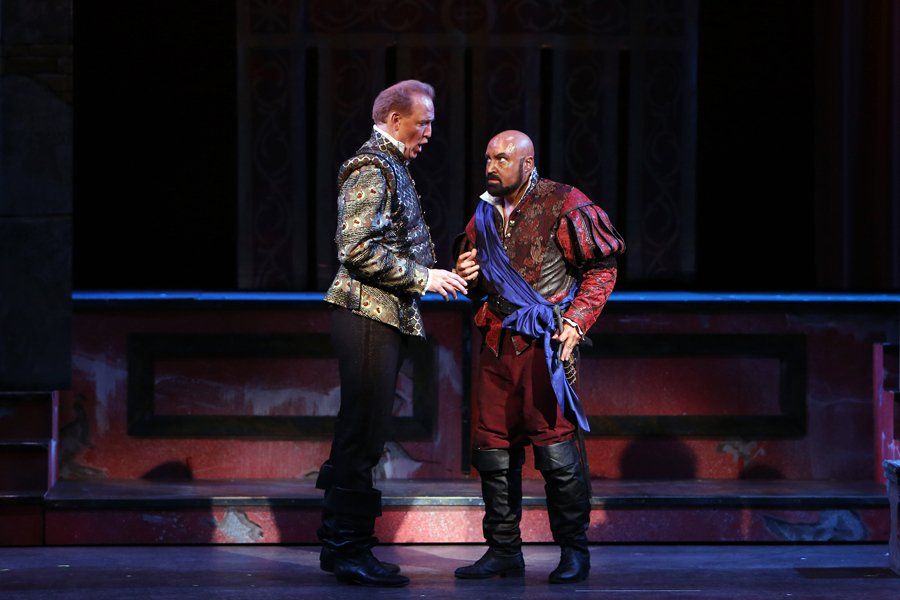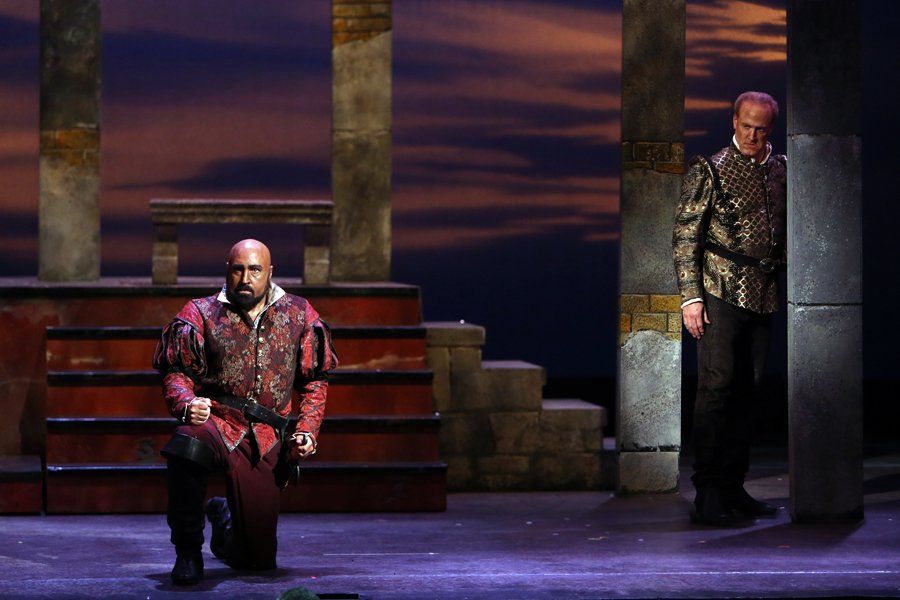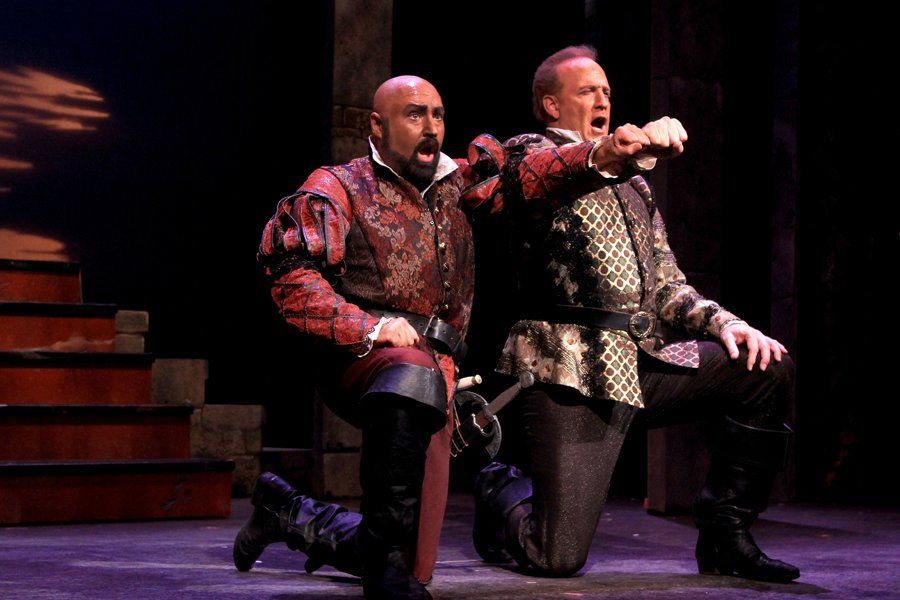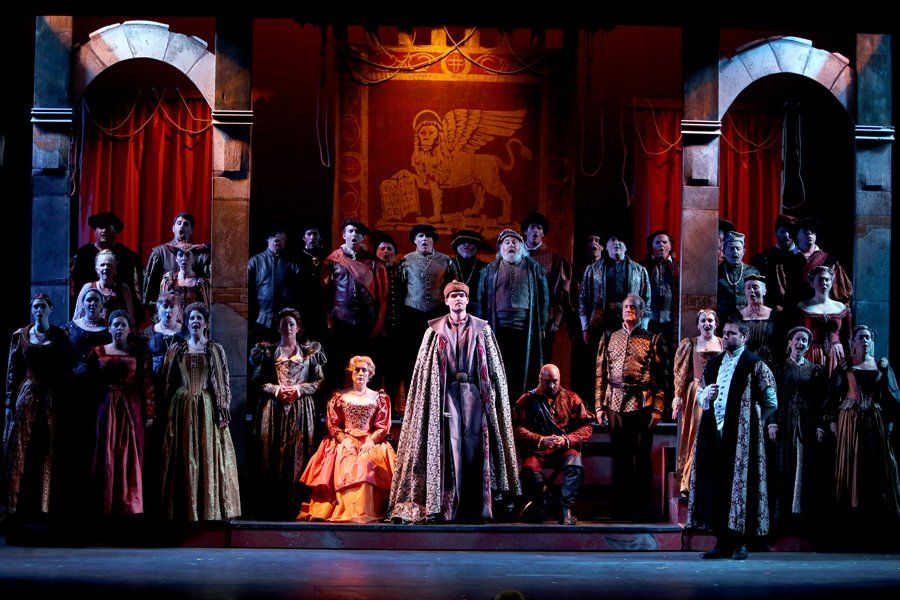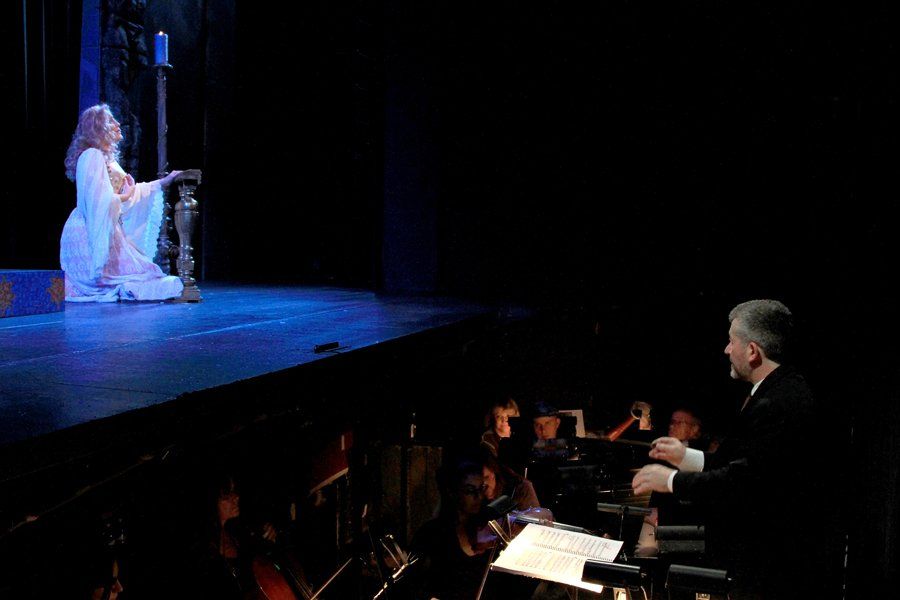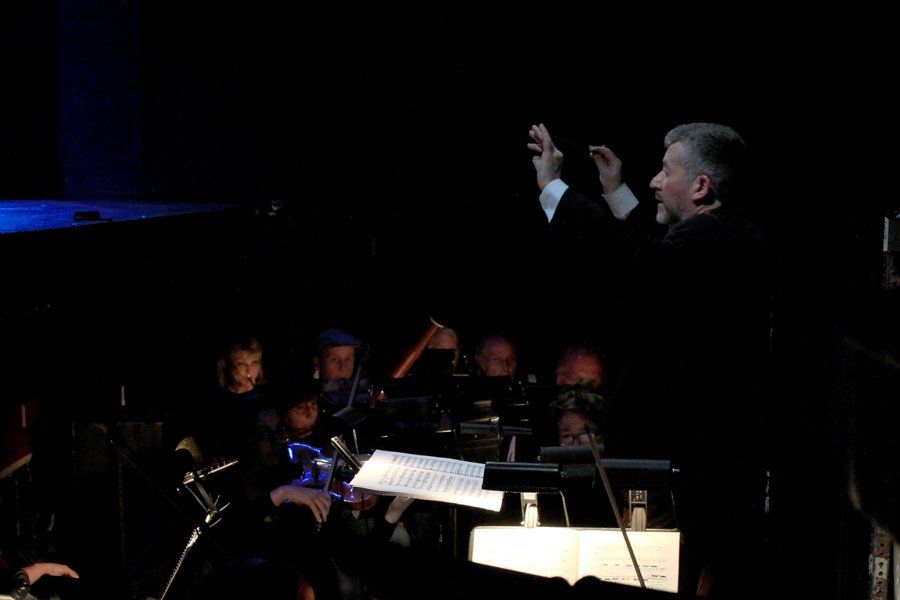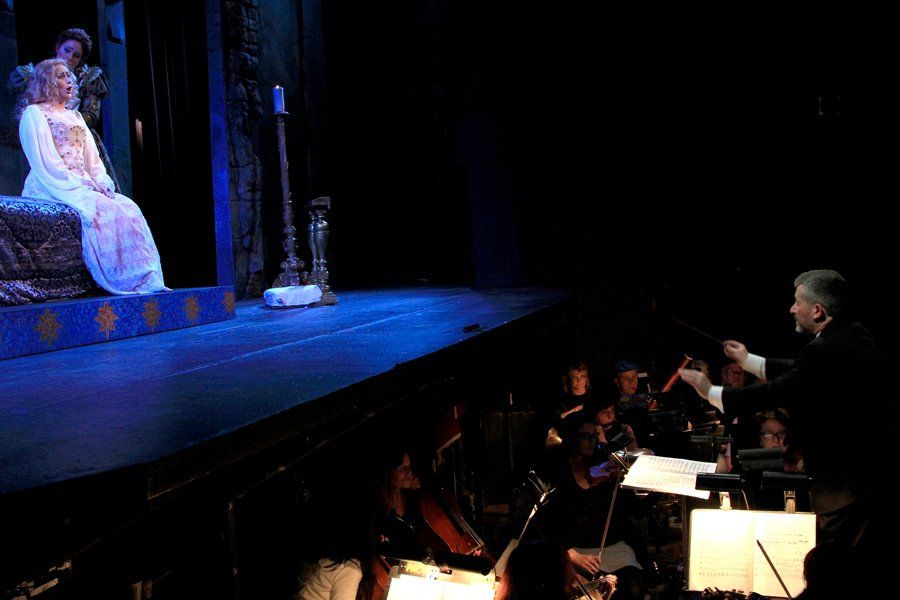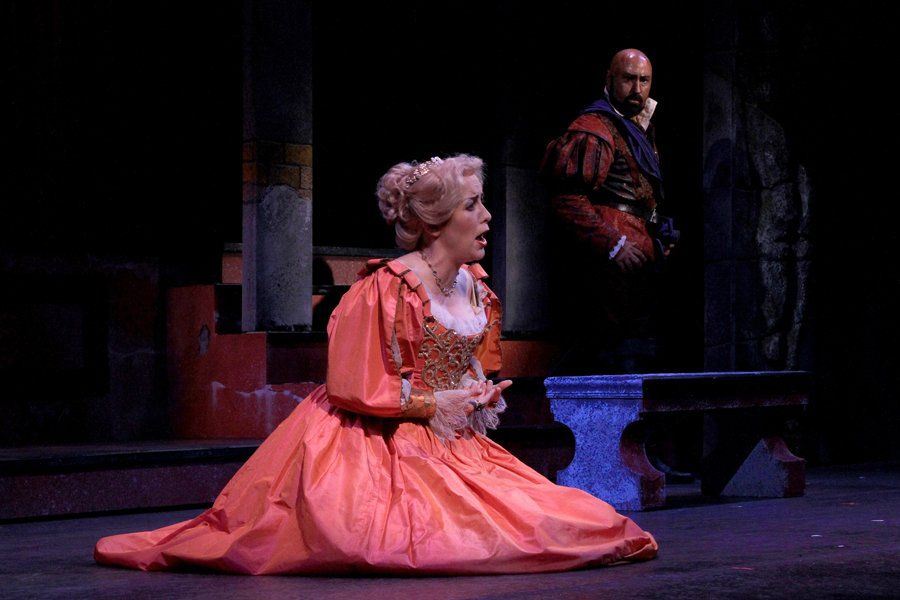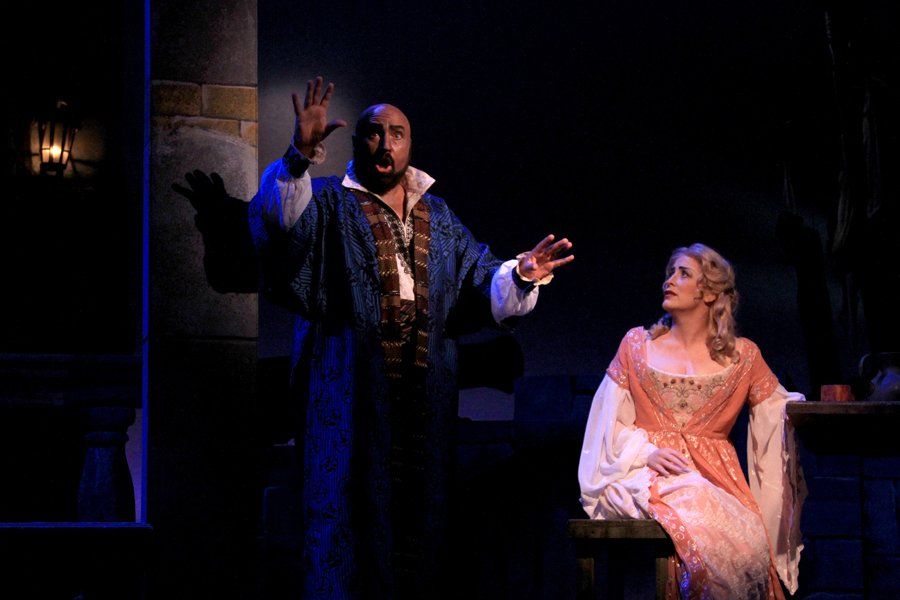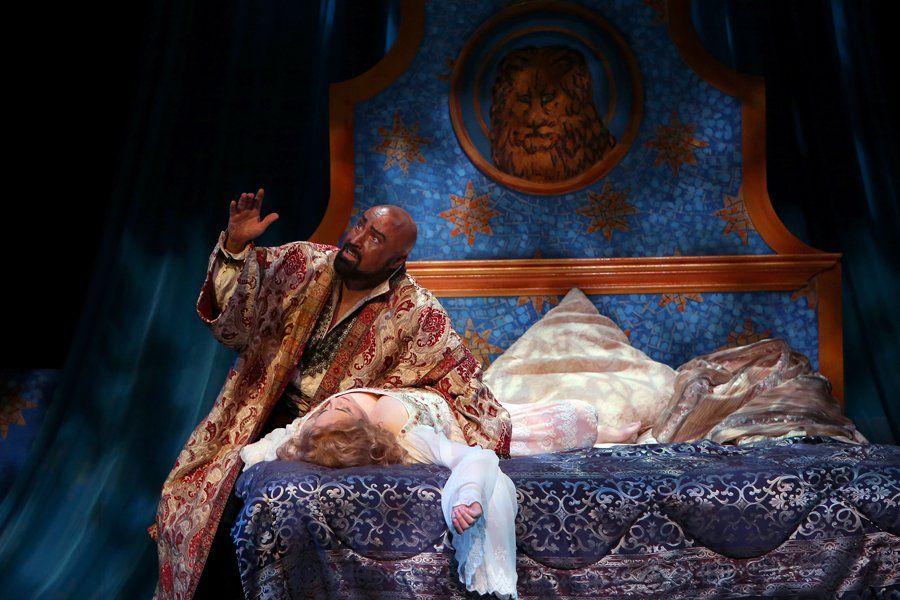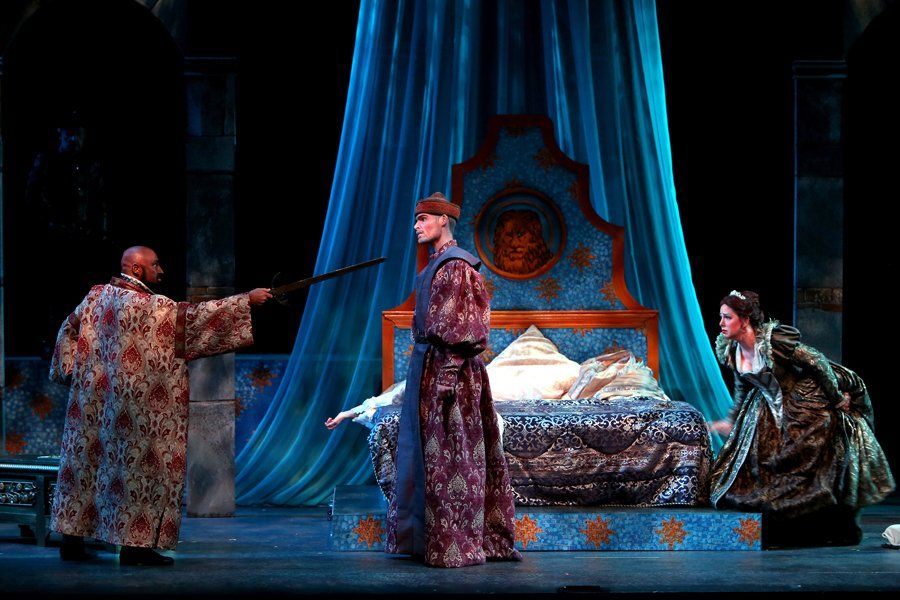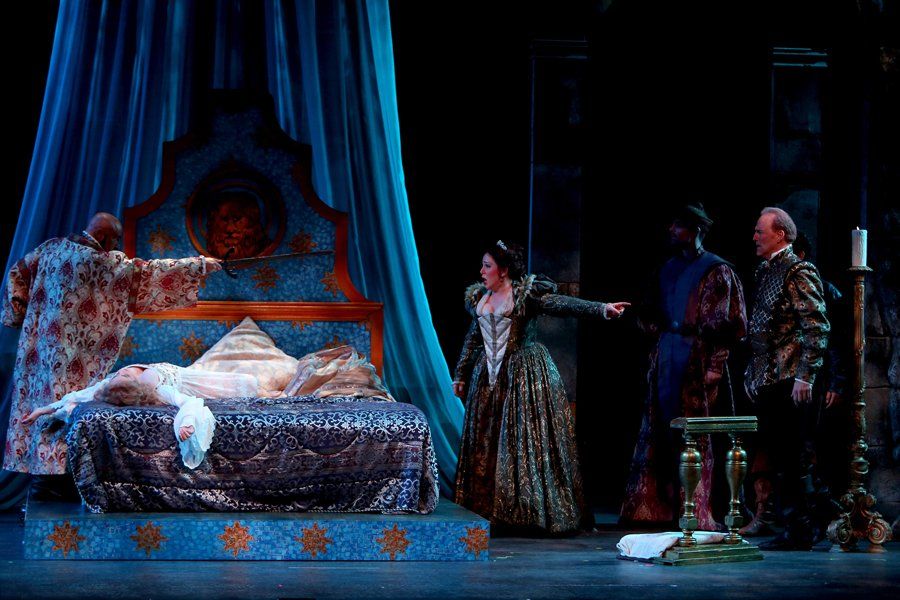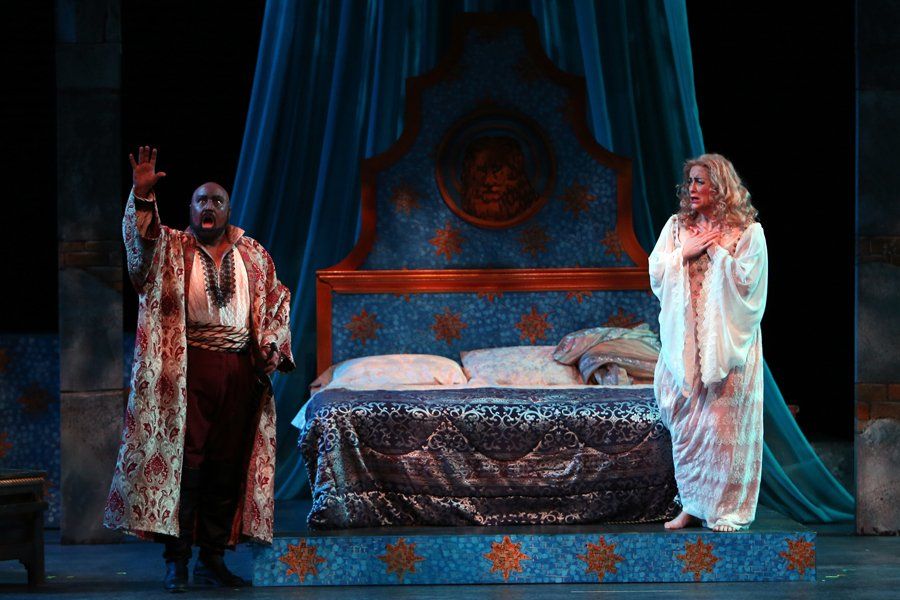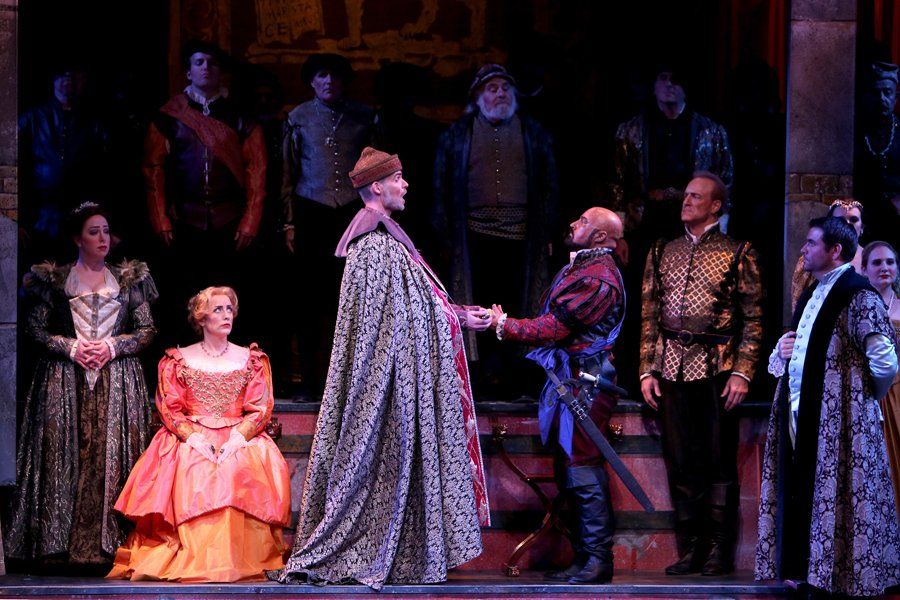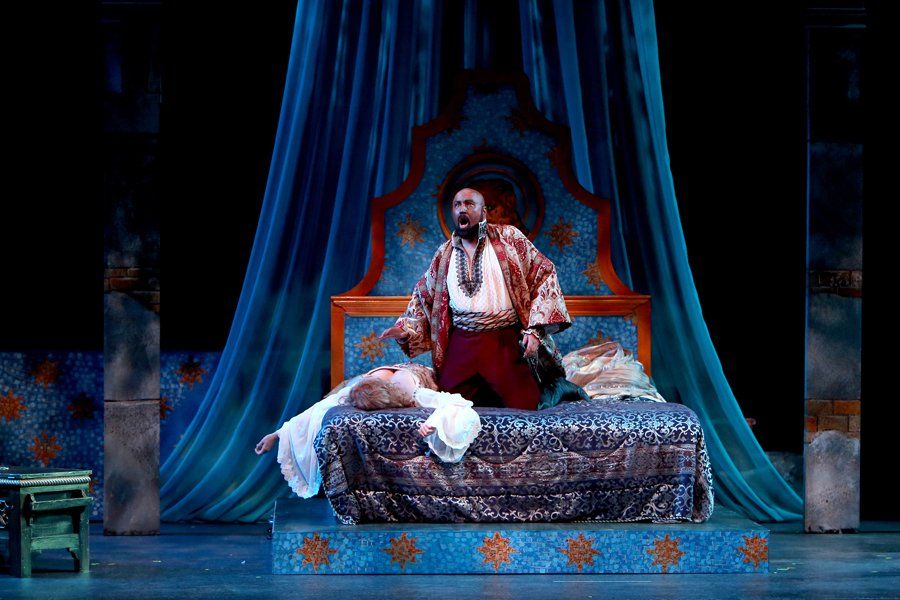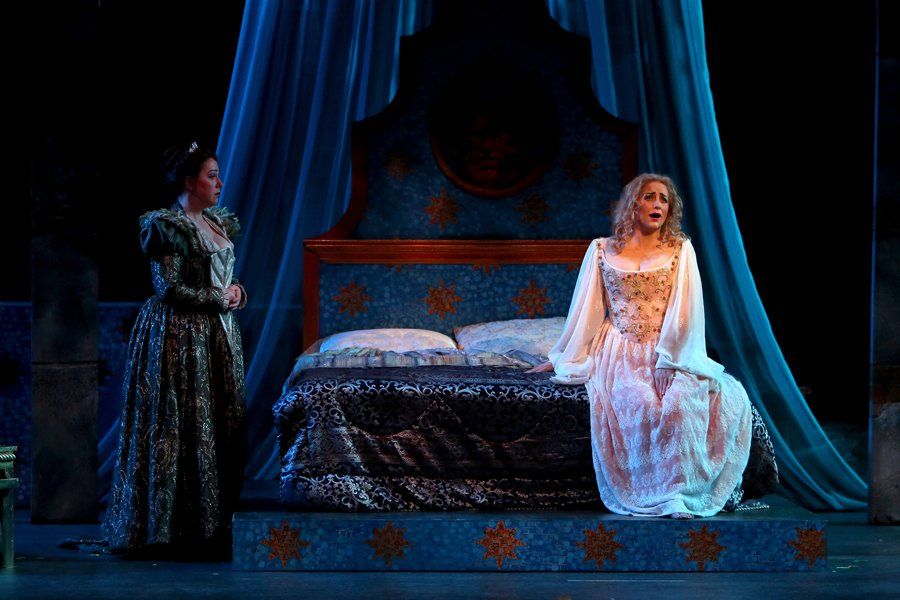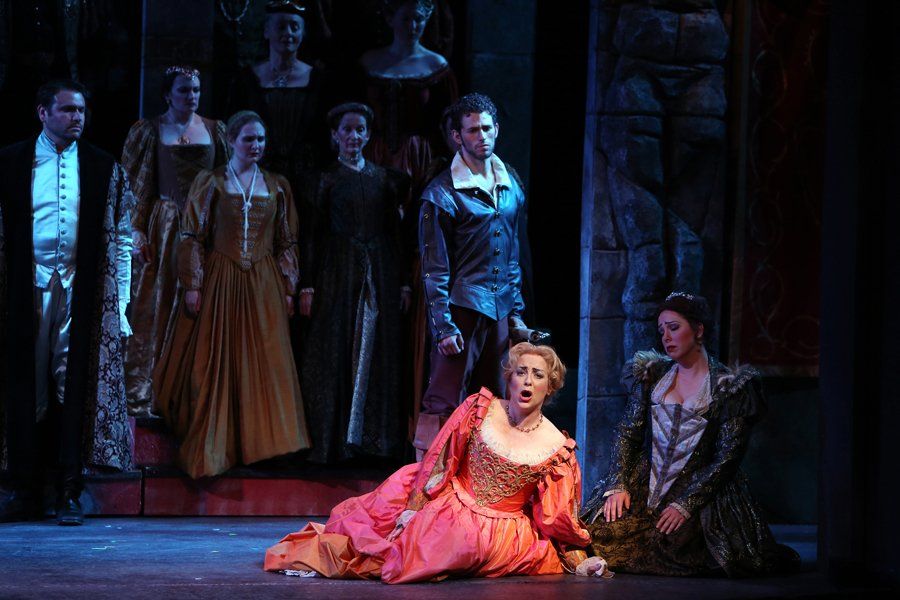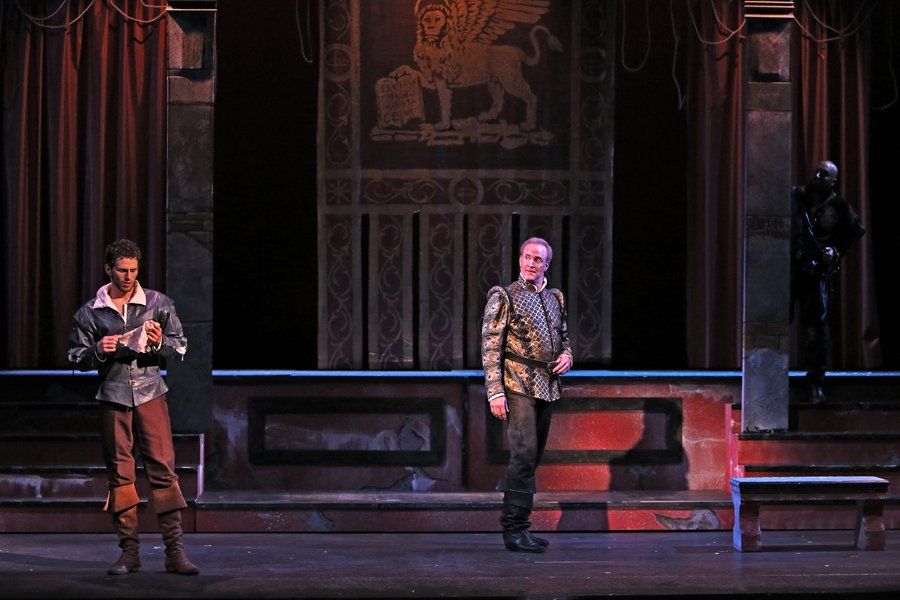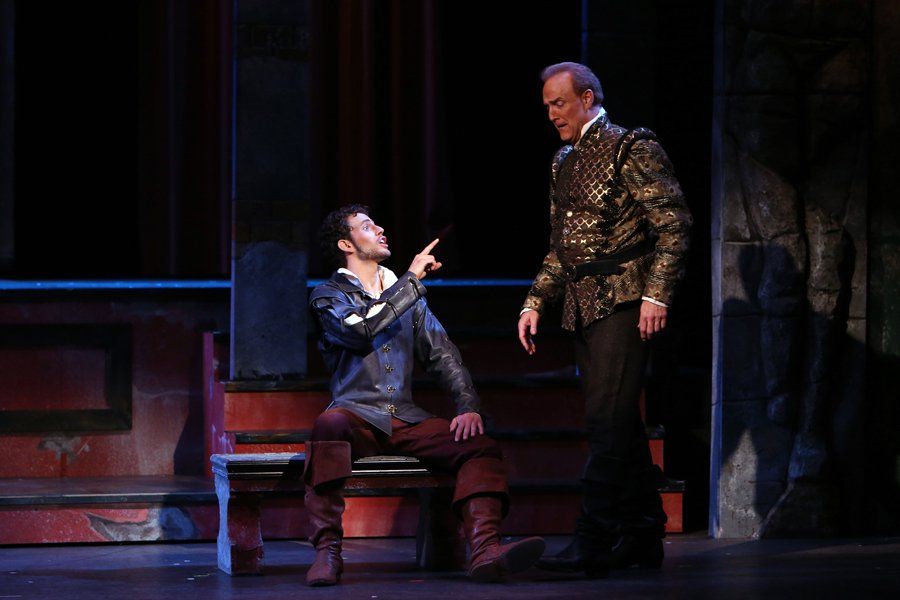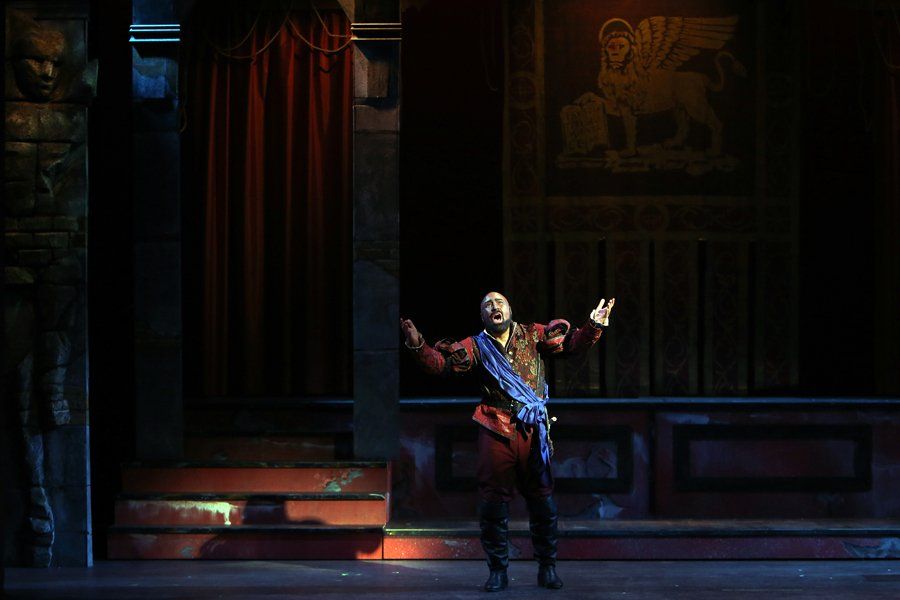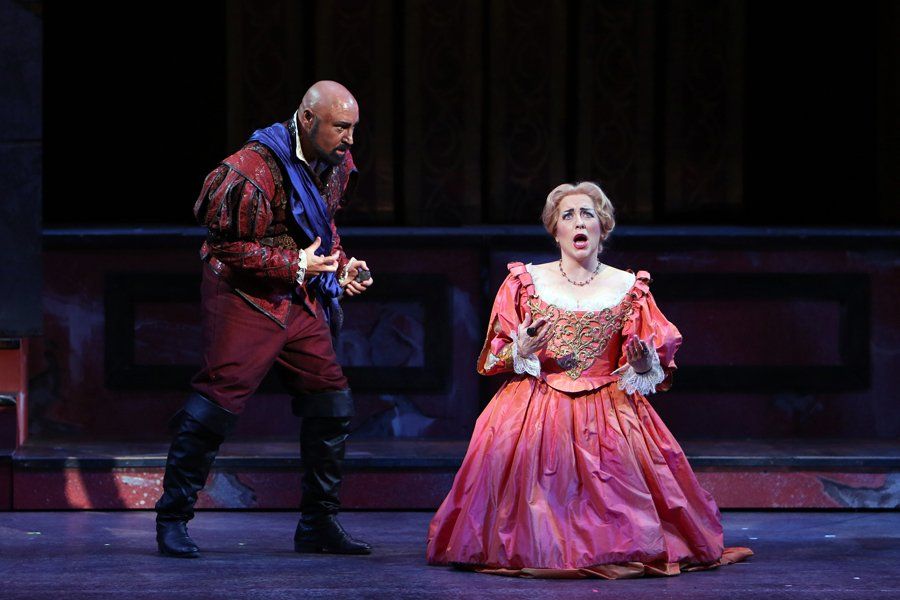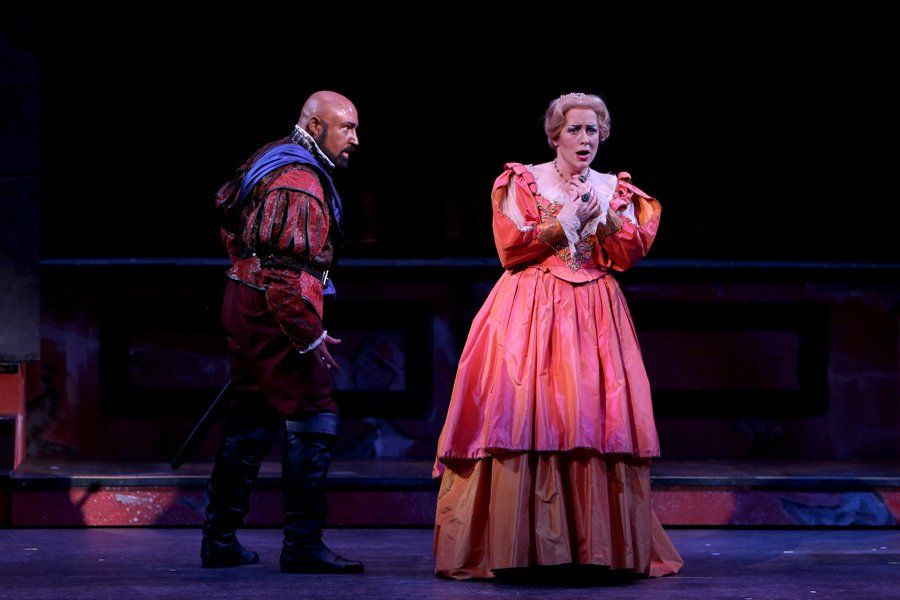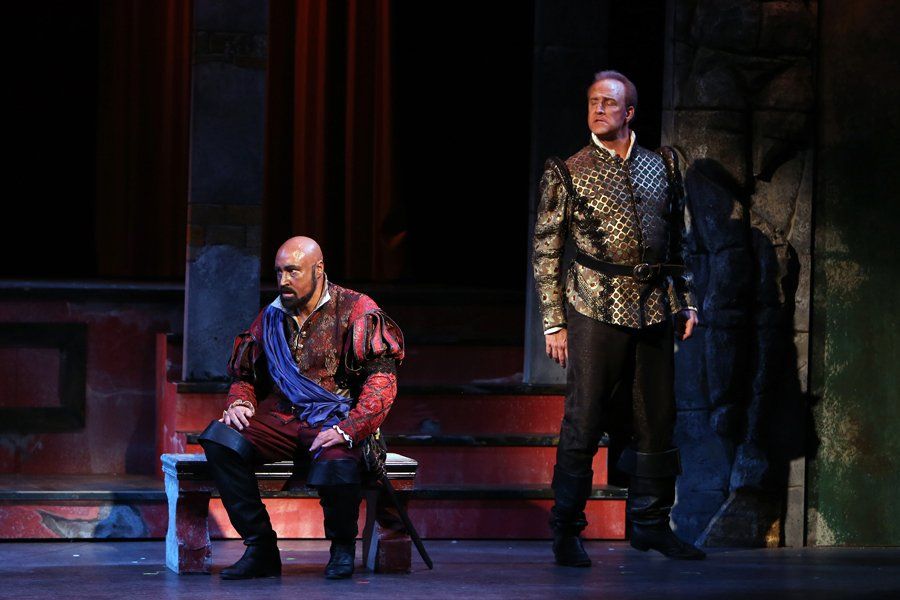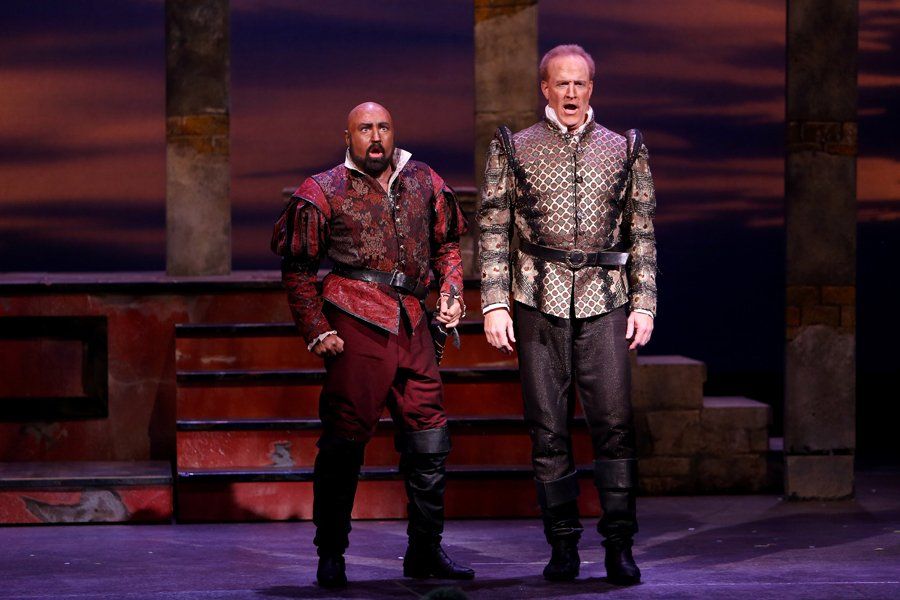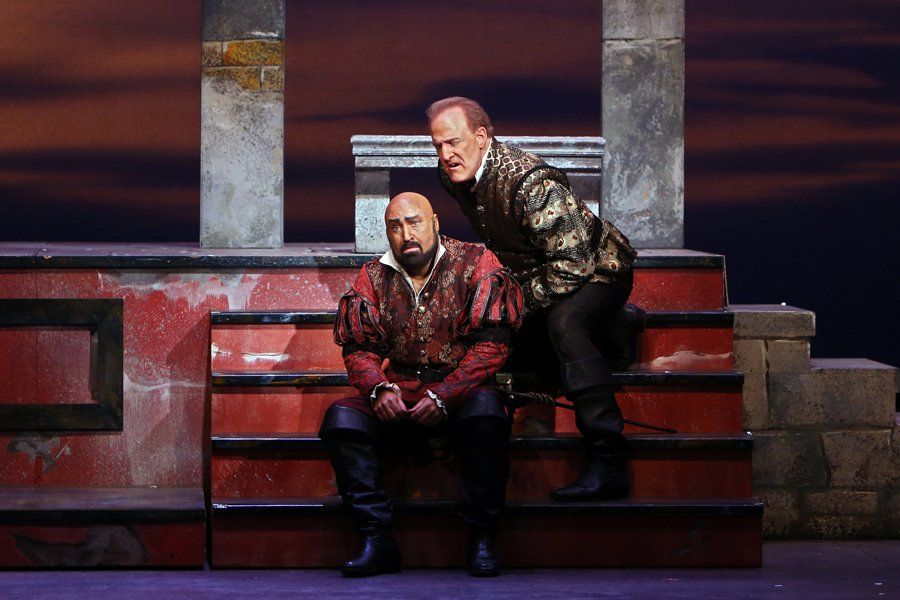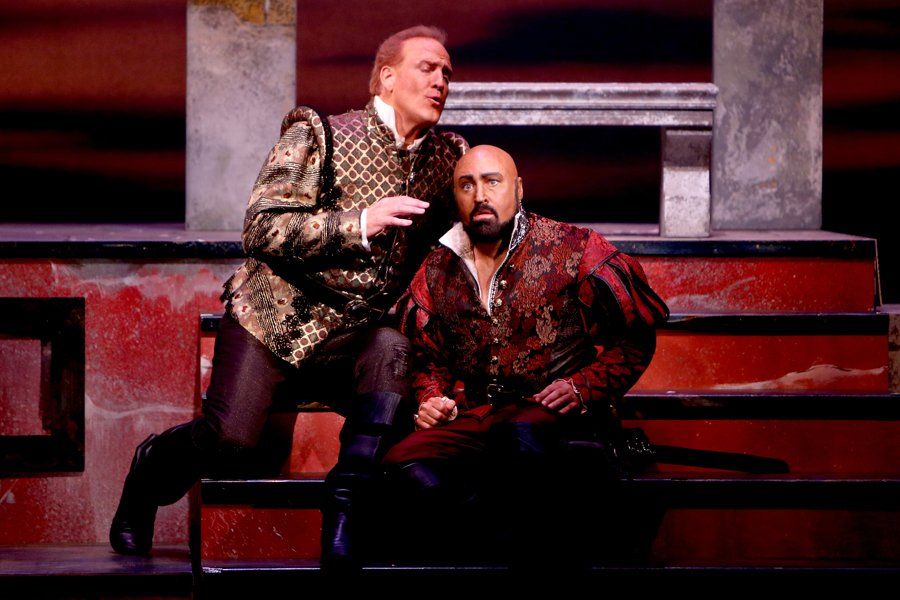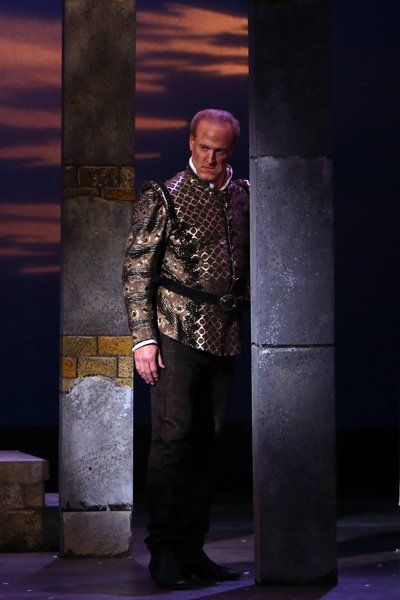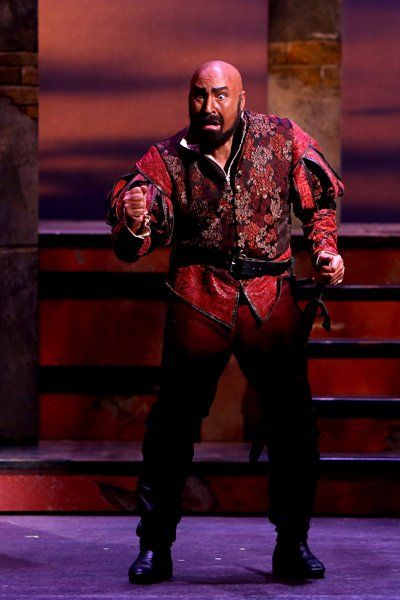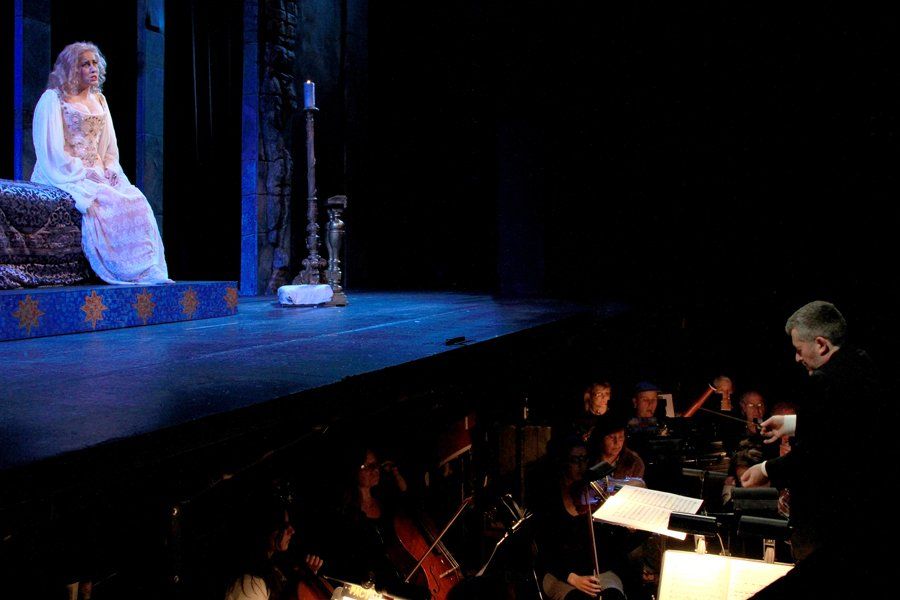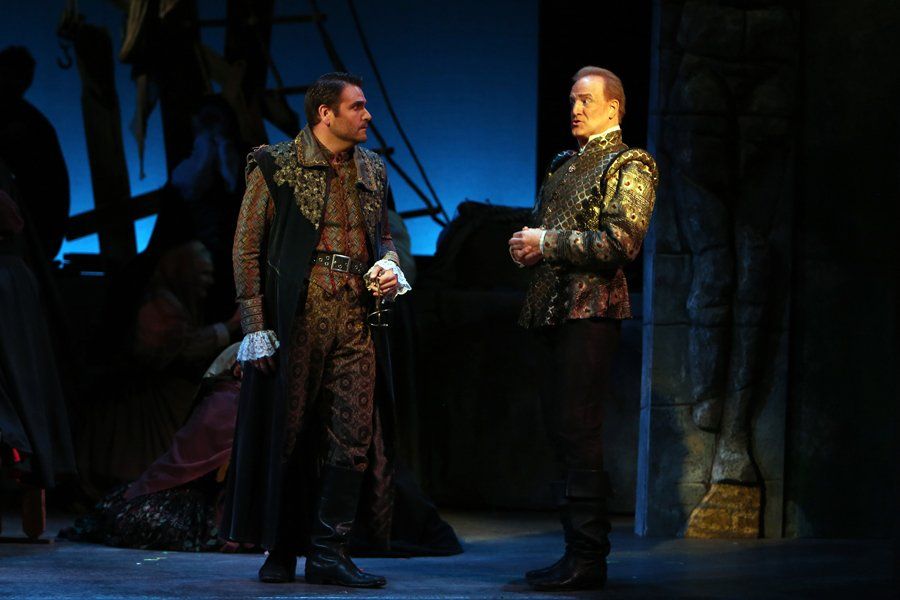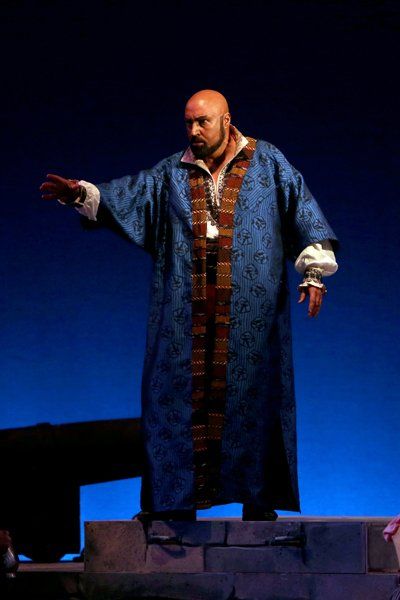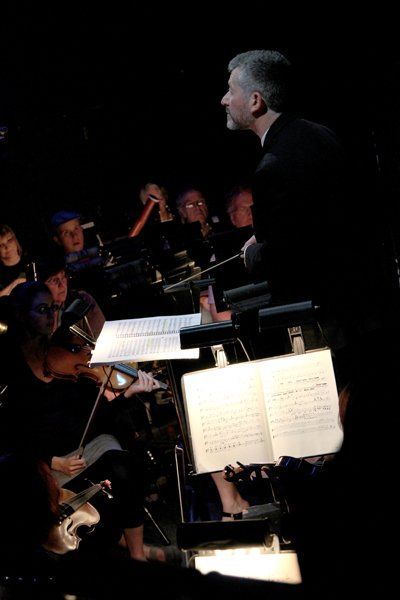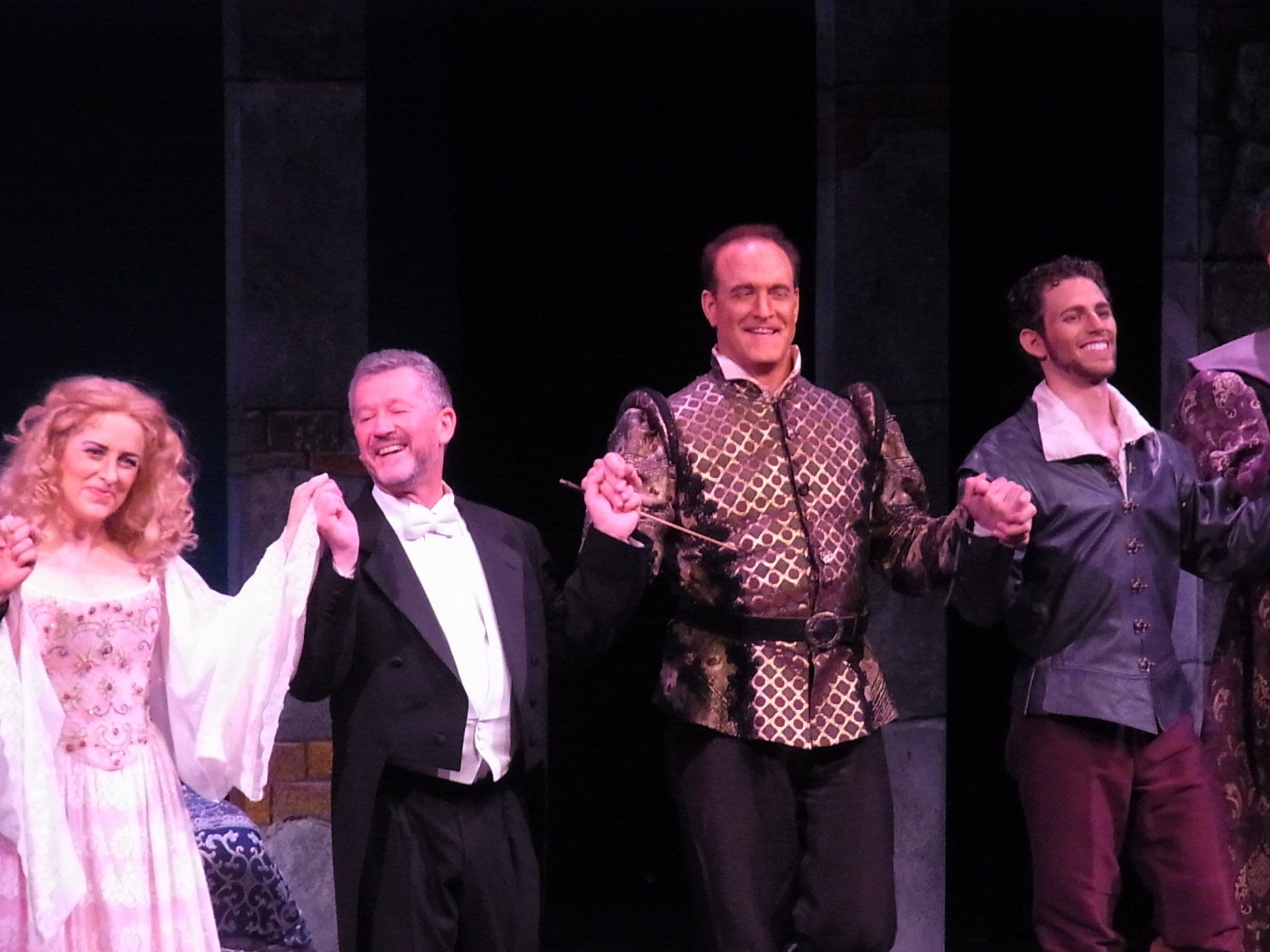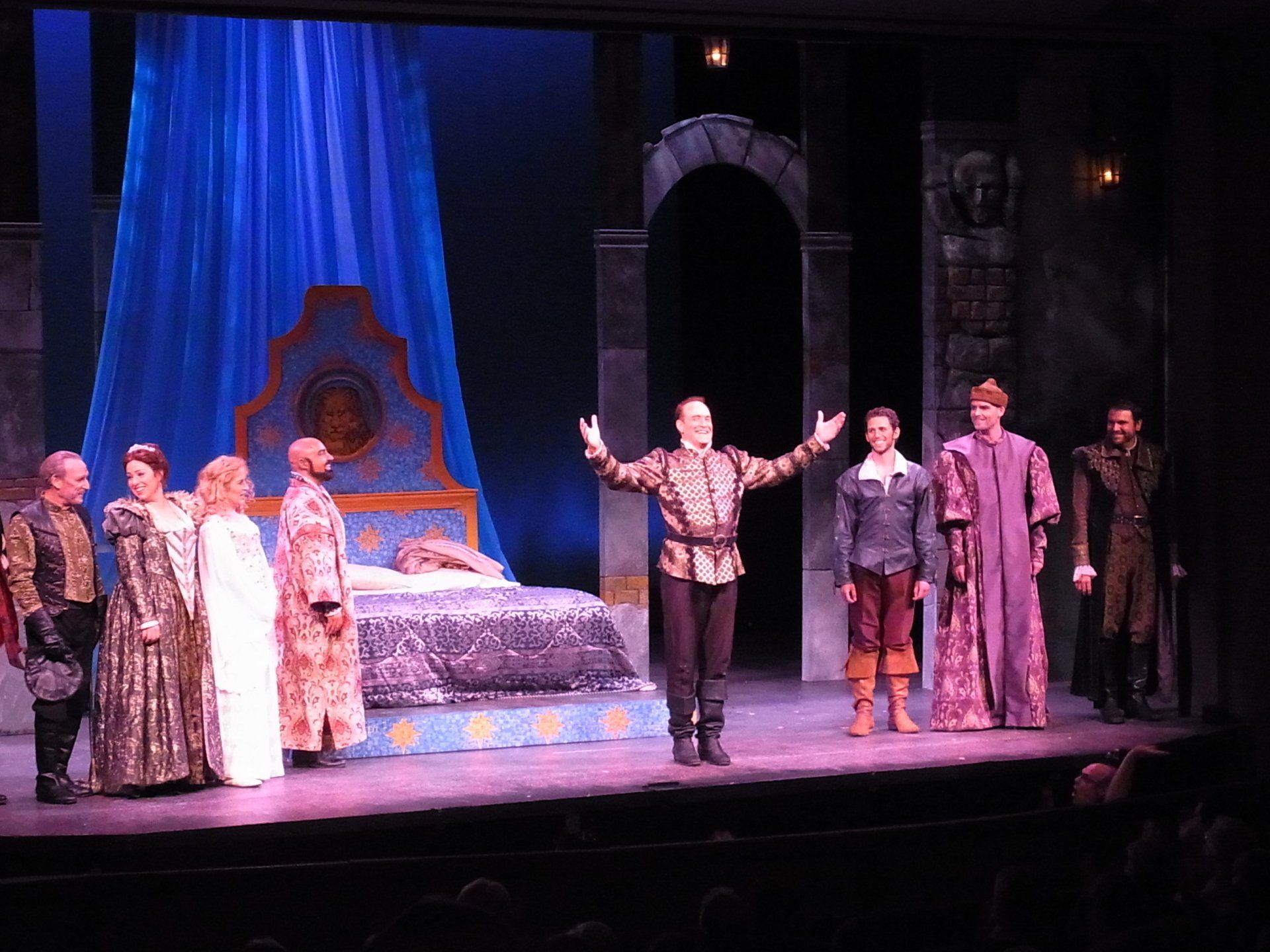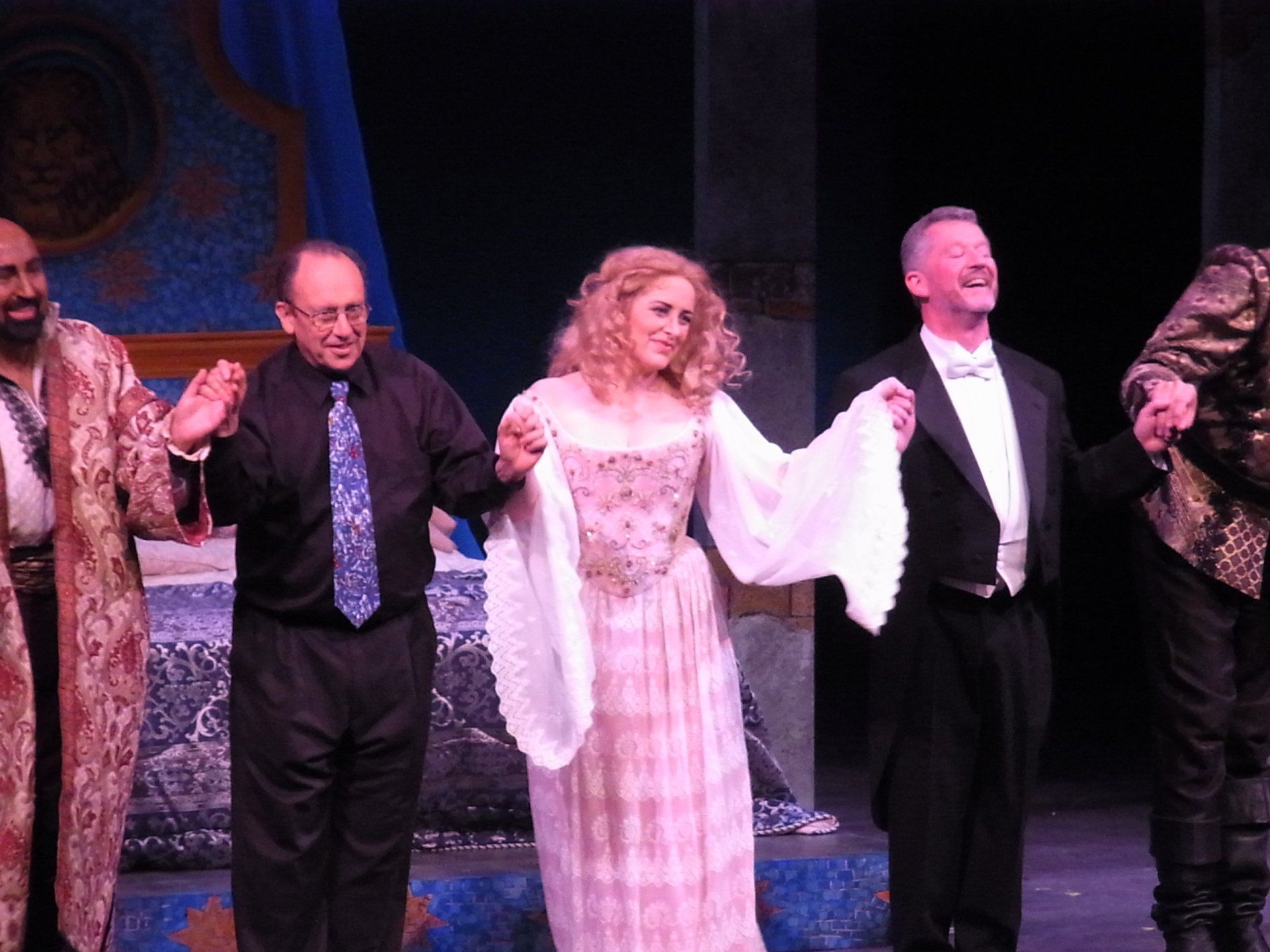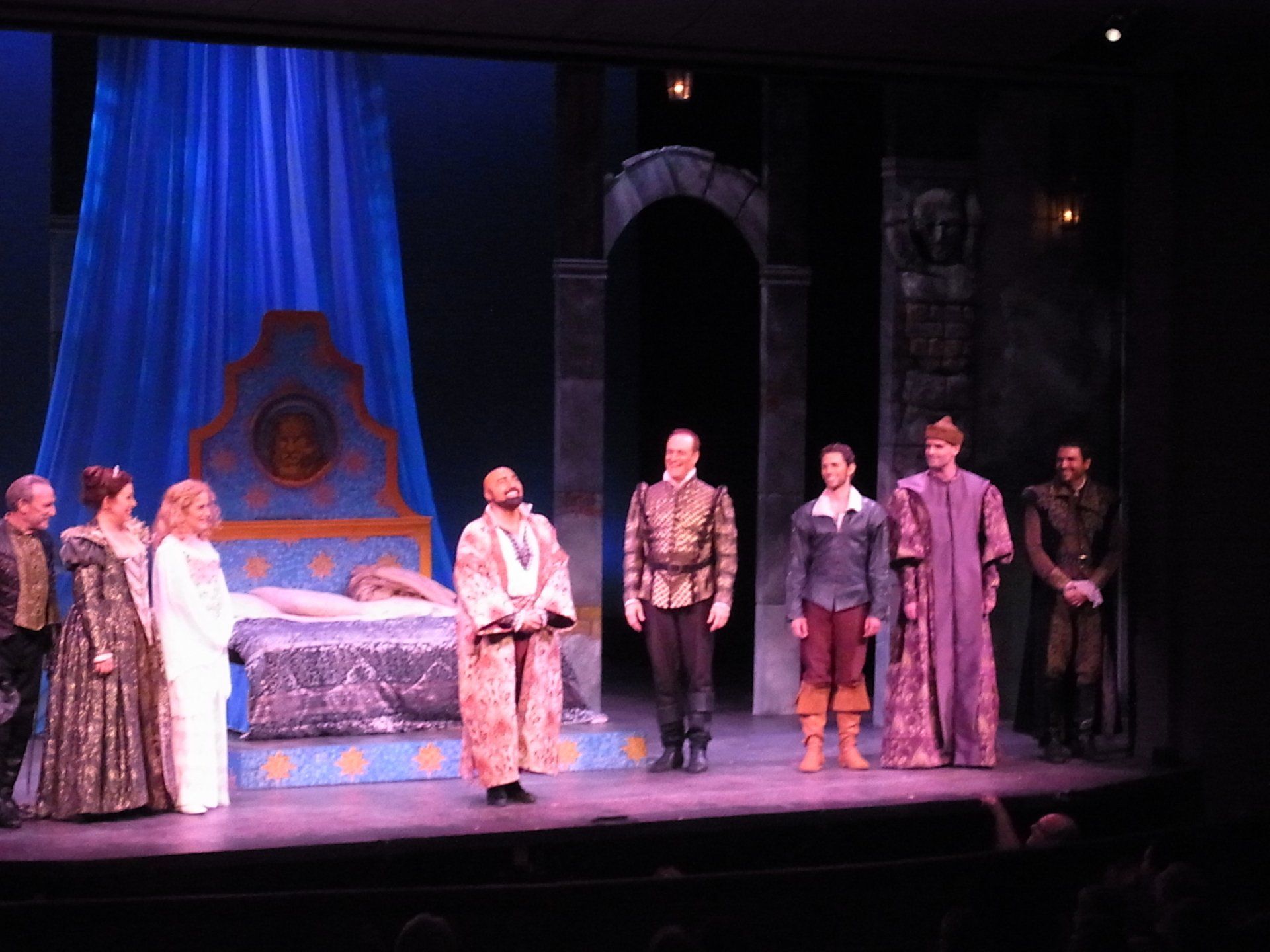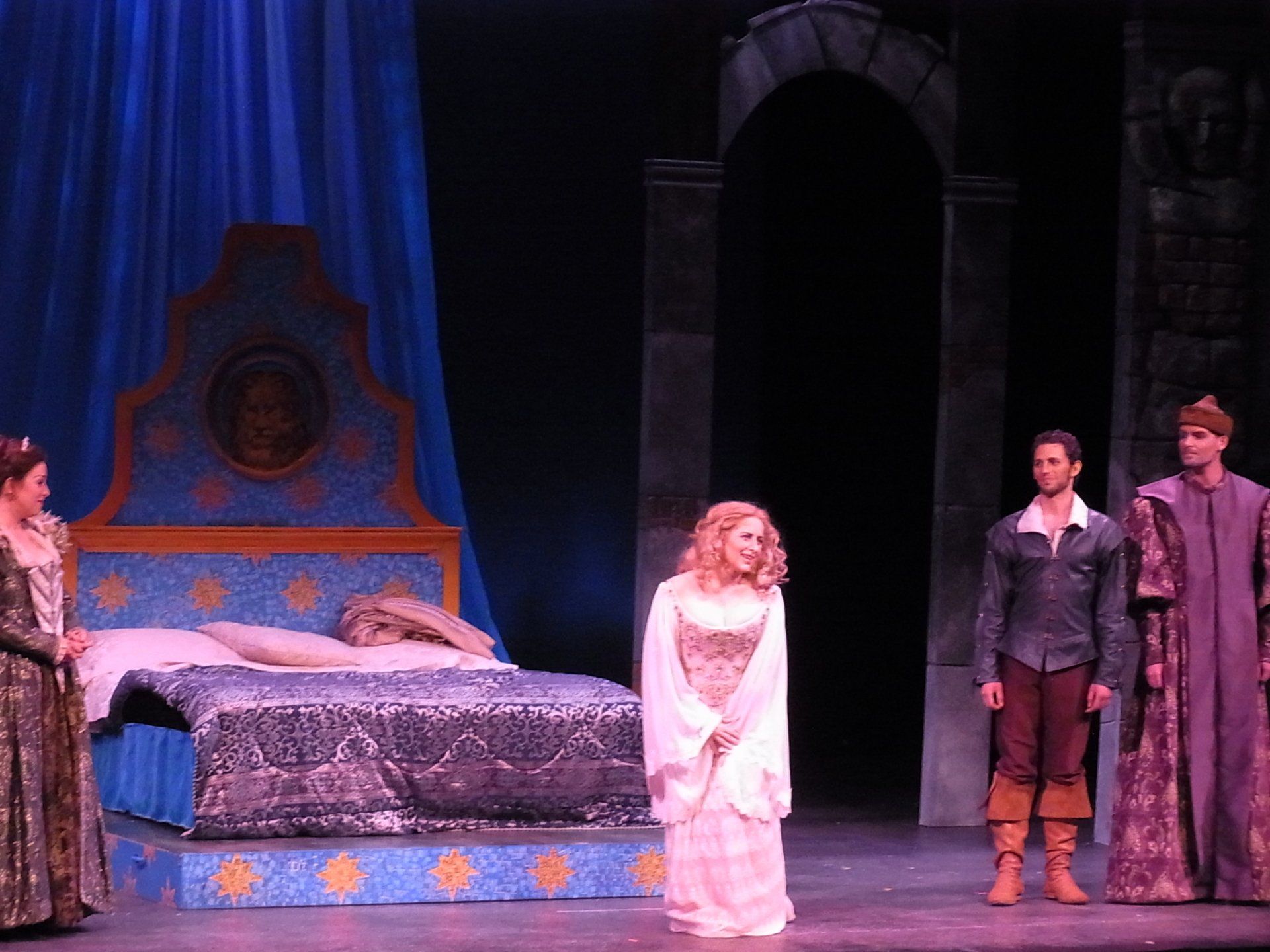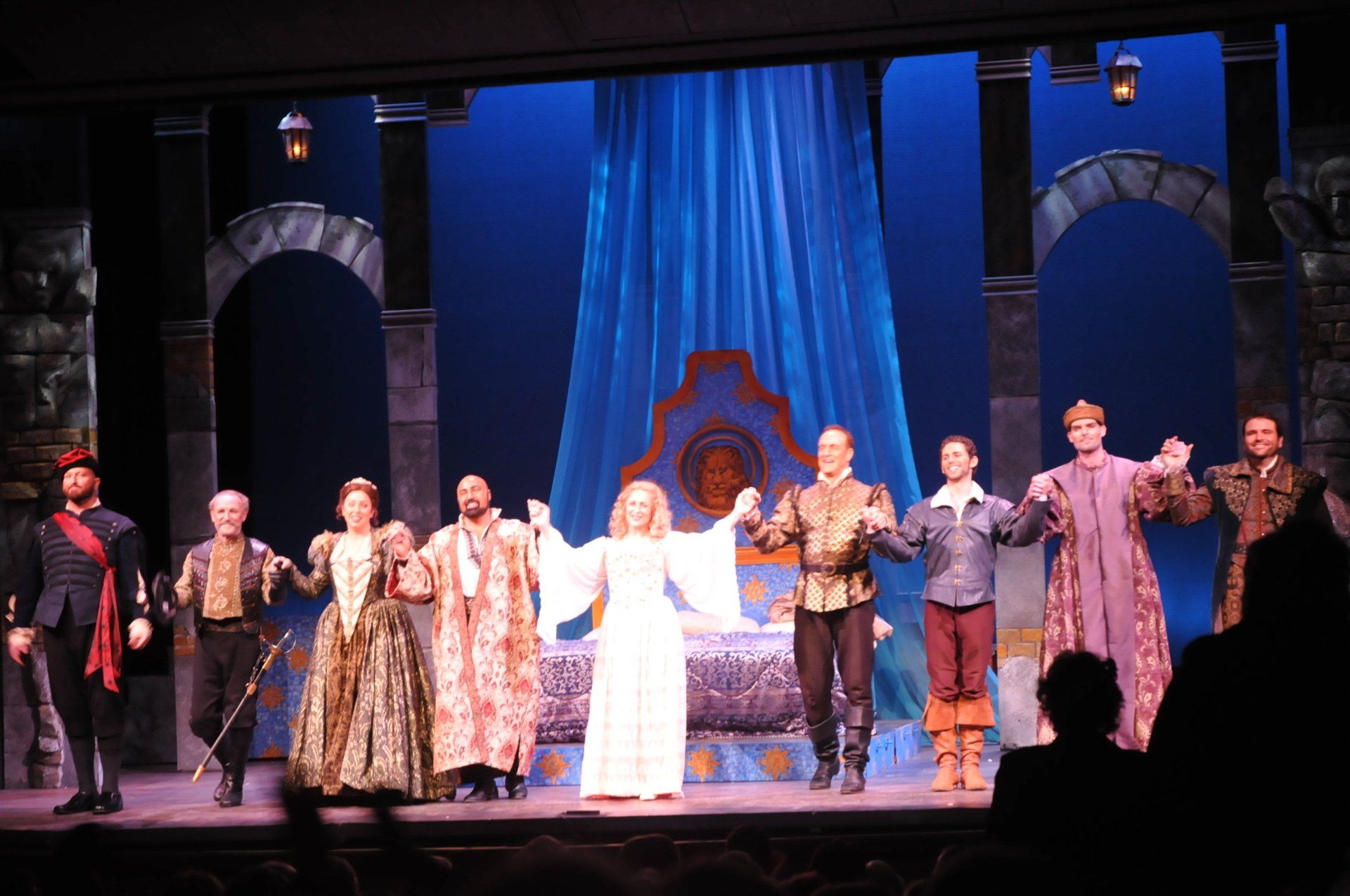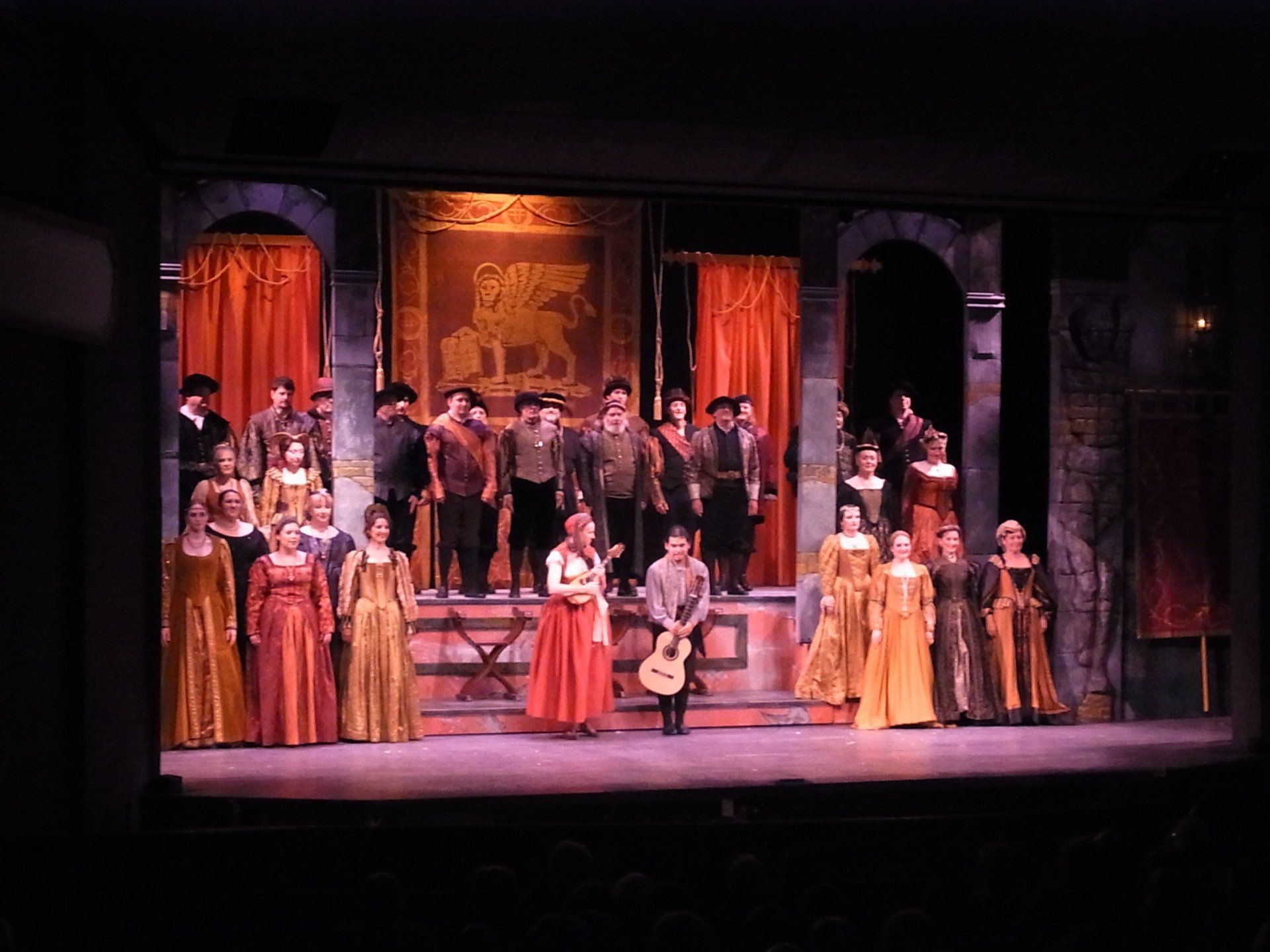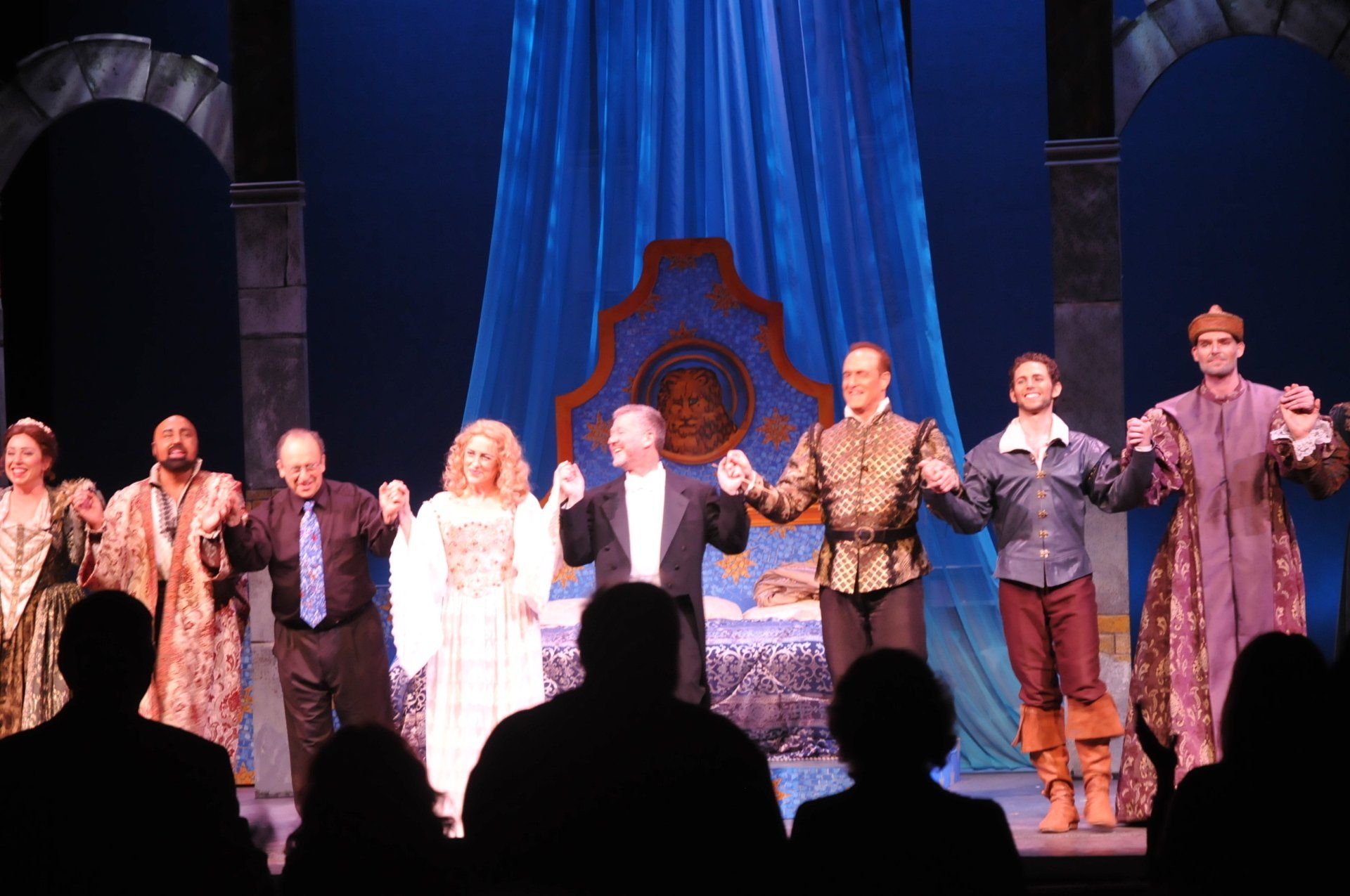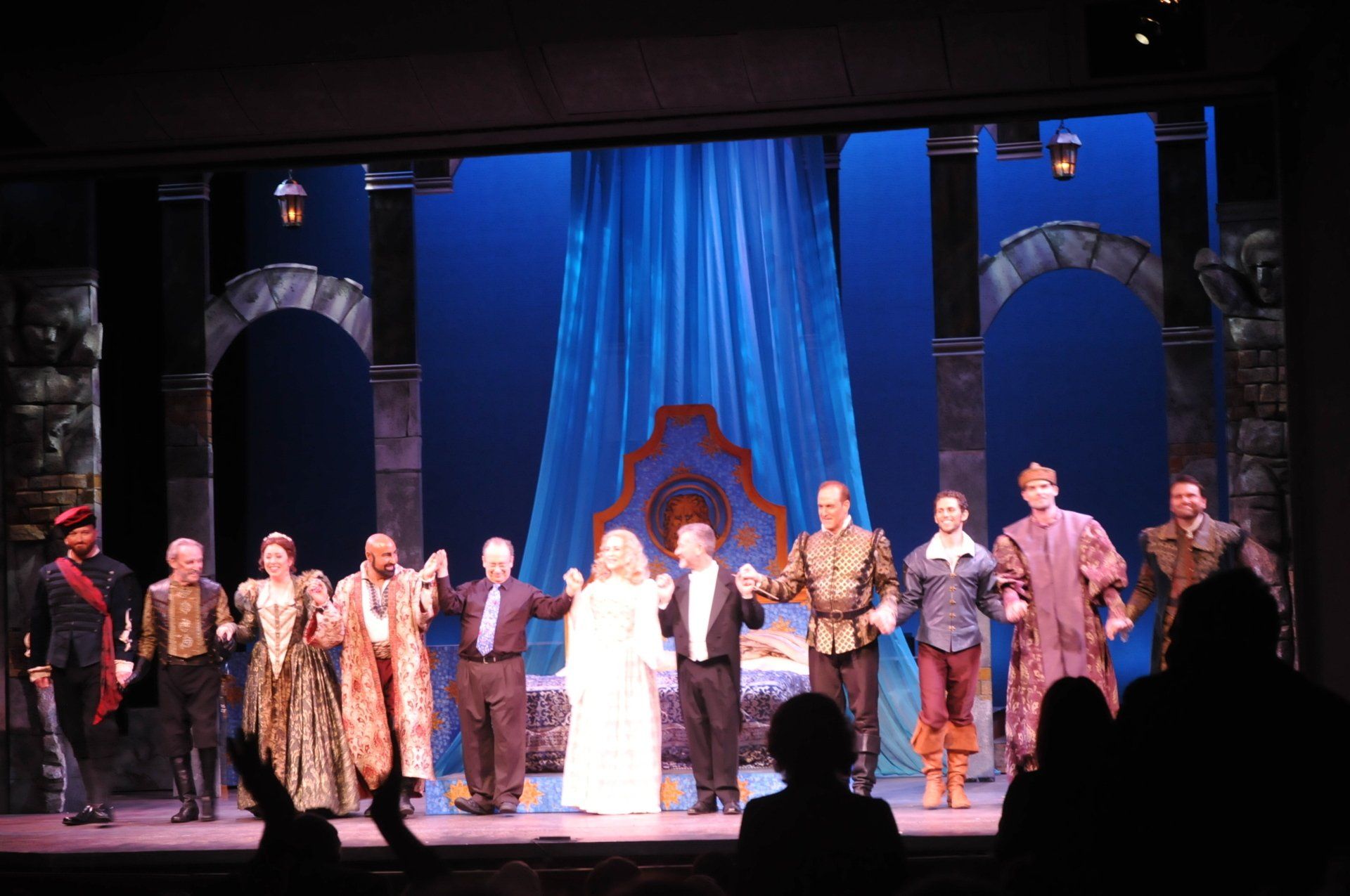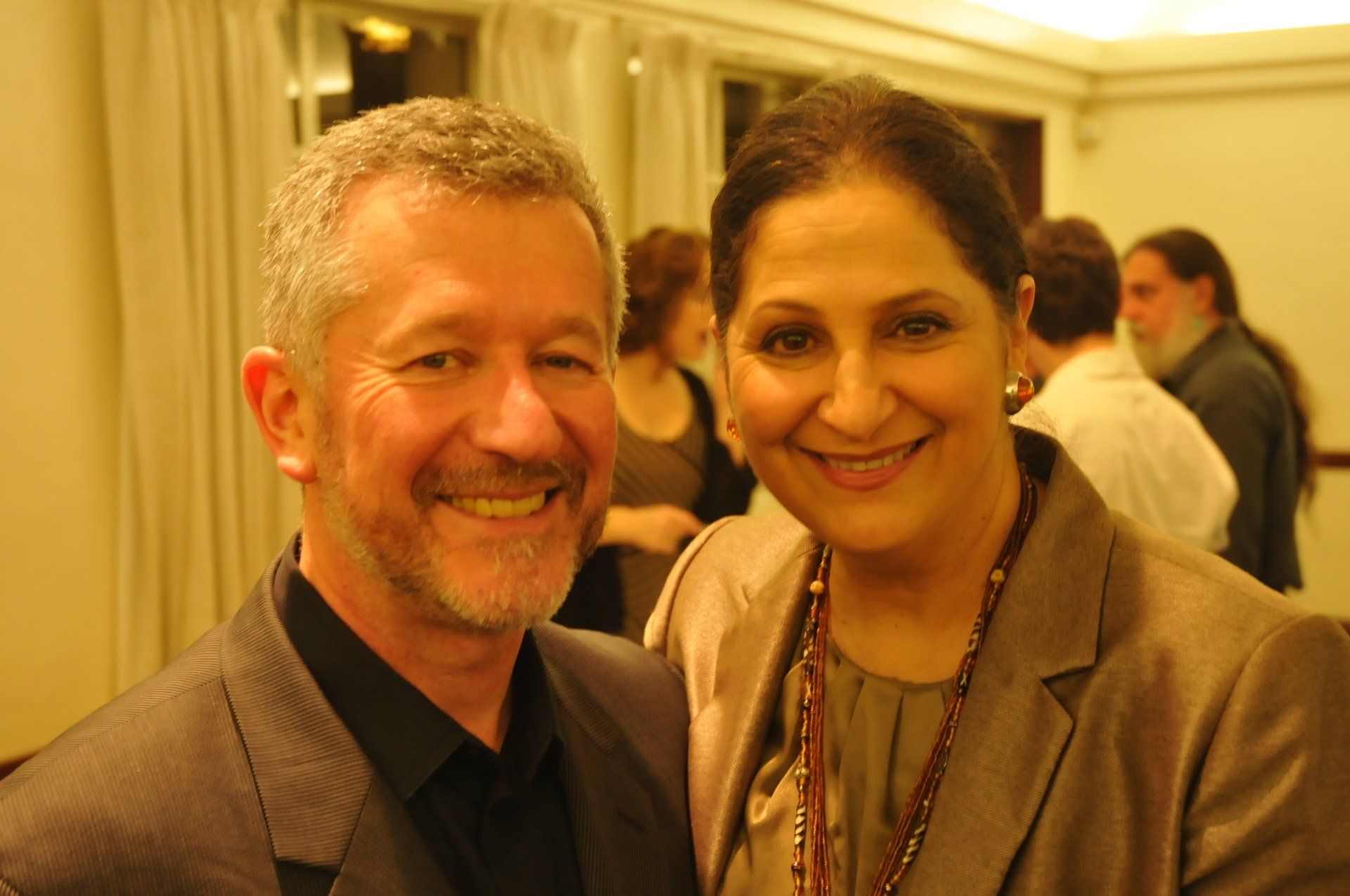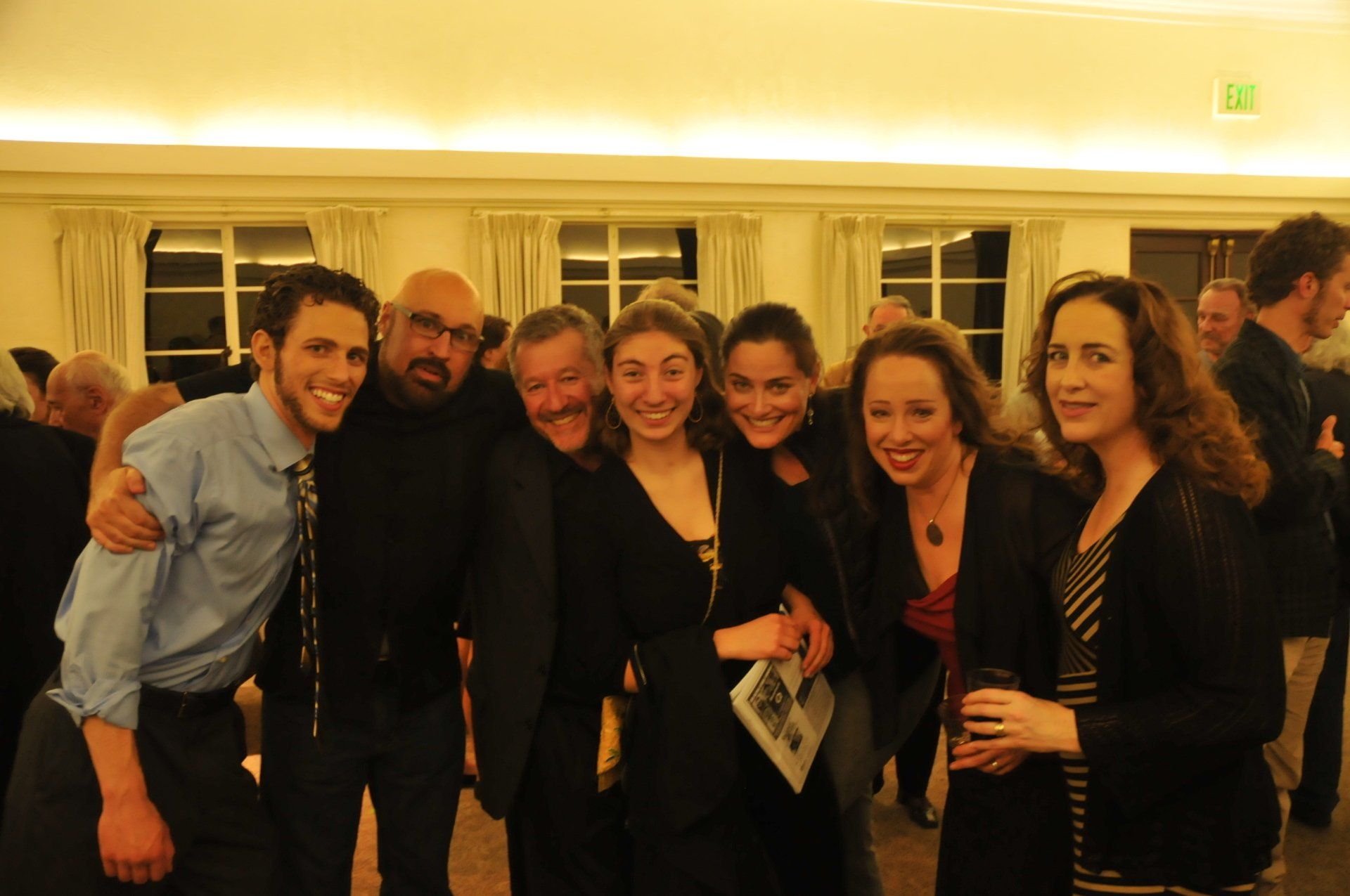Otello
Giuseppe Verdi
Libretto by Arrigo Boito
based on William Shakespeare's Othello
Friday, May 24 - 8 p.m.
Sunday, May 26 - 2 p.m.
Saturday, June 1 - 8 p.m.
Sunday, June 2 - 2 p.m.
at the Lucie Stern Theatre
1305 Middlefield Rd., Palo Alto, CA 94301
Performances are 2 1/2 hrs long,
including two intermissions.
Co-production with Festival Opera
FREE Preview with Piano
Thursday, May 16, 2013 - 8:00 p.m.
Avenidas
455 Bryant St., Palo Alto, CA 94301
About Otello
World Premiere: Teatro alla Scala, Milan - Feb 5, 1887
WBO Premiere: May 14, 1969
Pictured: interior of the Teatro alla Scala
After the success of
Aida, Verdi went into retirement. It took Giulio Ricordi several years to convince him to take on
Otello. This was Verdi's first collaboration with composer Arrigo Boito, who wrote the libretto based on Shakespeare. (Their second and final collaboration was
Falstaff.) It took more than five years for the opera to be ready for its premiere in 1887. The score is the work of a master composer fully in control of the story's dramatic arc, able to convey nuance and depth of characterization, and capable of further illuminating Shakespeare's own work.
Creative team
José Luis Moscovich - Conductor
Daniel Helfgot - Stage Director
Peter Crompton - Set Designer
Callie Floor - Costume Designer
Steve Mannshardt - Lighting Designer
Rande Harris - Makeup and Wig Designer
Shirley Benson - Props Designer
Tod Nixon - Sound Designer
Pictured: costume designs by Abra Berman
Cast
Otello - David Gustafson
Desdemona -Cynthia Clayton
Iago - Philip Skinner
Cassio - Nadav Hart
Lodovico - Matthew Lovell
Roderigo - Adam Flowers
Emilia - Michelle Rice
A herald - Jay Iness
Iago understudy - Igor Vieira
Desdemona understudy - Diane Sintich
Chorus
CHORUS of cypriots, soldiers and peasants: James Armstrong, Georgianna Askoff, Jackson Beaman, Joanne Bogart, Richard Bogart, Martin Case*, Will Corvino, Bruce Cozzini, Michael Crozier, Tom Ellison, Kristin Genis Lund, Inna Gitman, John Graham*, Christopher Hawks, Terry Hayes, Lisa Hmelar, Jay Iness, Claire Karoly*, David Kirby, Peter Lawthers*, Alexandra Lopiano, Amber McDonald, Leigh Madeline Nelson, Mark Nelson, Andrew Nickell*, Erwin Oertli, Elizabeth Patterson, Virginia Phelps, Vadim Rivkin*, Philip Schwarz, Jenissara Sumiri, Theresa Whitney-Corvino, Diane Yeramian.
* First appearance with WBO
ORCHESTRA
Concertmaster | Kristina Anderson
Violin I | Lina Bouze, Virginia Smedberg
Violin II | Rebecca MCormick, Janet Galbraith, Frida Pukhachevsky
Viola | Janet Lynch-Gillespie, Ilana Matfis*
Cello | Kris Yenney, Maria Luciana Gallo
Bass | Christy Crews
Harp | Randall Pratt
Flute/Piccolo | Michelle Caimotto
Oboe/English Horn | Peter Lemberg
Clarinet | Art Austin
Bassoon | Doug Brown
Horn | Alicia Telford, Diane Ryan
Trumpet | Rick Leder
Timpani | Don Baker
Percussion | Norman Peck
Thunder Effects | Amy Worden.
ONSTAGE MUSICIANS:
Guitar | Adrián Murillo
Mandolin | Nicola Swinburne
Production Staff
Technical Director: Jean-François Revon
Production Manager: Michele Sullivan-Williamson
Box Office Manager: Paul Glew
Stage Manager: Sarah Terman
Costume Shop Supervisor: Merna Black
Orchestra Manager: Christy Crews
Orchestra Librarian: Virginia Smedberg
IT Services: Laszlo Papp, Bob Vaughn
Click below to see the full listing of the
Otello 2013 - Media Gallery
VIDEOS
Otello 2013 - Media Gallery
PRODUCTION PHOTOS by Otak Jump
-
Button
Opening scene. Center (top) Philip Skinner as Iago. Foreground, West Bay Opera chorus.
-
Button
Cynthia Clayton (Desdemona) and David Gustafson (Otello)
-
Button
L to R: Iago (Philip Skinner) and Otello (David Gustafson)
-
Button
Center foreground (L to R): Emilia (Michelle Rice), Desdemona (Cynthia Clayton, seated), Lodovico (Matthew Lovell), Otello (David Gustafson, seated), Iago (Philip Skinner), Roderigo (Adam Flowers). Background: West Bay Opera Chorus members.
-
Button
Maestro Moscovich and the West Bay Opera orchestra.
-
Button
L to R: Otello (David Gustafson) and Lodovico (Matthew Lovell)
-
Button
L to R: Otello (David Gustafson), Desdemona (Cynthia Clayton), Emilia (Michelle Rice) and Iago (Philip Skinner).
-
Button
L to R: Desdemona (Cynthia Clayton) and Emilia (Michelle Rice)
-
Button
L to R: Casio (Nadav Hart) and Iago (Philip Skinner)
Festival Opera Exec Director Sara Nealy and West Bay Opera General Director José Luis Moscovich. Opening night cast party.
Cast Party picture: L to R: Nadav Hart, David Gustafson, José Luis Moscovich, Anna Schwartz-Cohen, Diane Sitich, Michelle Rice, Cynthia Clayton.
Otello 2013 - Media Gallery
PRODUCTION VIDEOS
Otello 2013 - Press and Reviews
- Read the Otello review in the Repeat Performances
by Adam Broner
Friday, May 31, 2013
Otello at WestBayOpera
2013-05-24
Vittoria! Evviva! Giuseppe Verdi’s Otello, co-produced by West Bay Opera of Palo Alto and Festival Opera of Walnut Creek, affirms the vitality and relevance of Bay Area regional opera. This unique collaboration shows both a prudent response to financial challenges of producing opera and creates an exciting partnership that brings into our communities a cultural experience of magnitude and beauty.
An enthusiastic full house packed Palo Alto’s Lucie Stern Theatre for Friday night’s opening performance under conductor José Luis Moscovich. Director Daniel Helfgot gets right into the heart and mind of Otello, the heroic and vainglorious Venetian Governor of Cyprus whose hold on certainty proves to be his undoing after Iago stirs within him the poison of doubt. All aspects of this production—Peter Crompton’s inspired set design, Steve Mannshardt’s mood-driven lighting, and Callie Floor’s lavish, Venetian jewel-toned costumes—work together to convey Helfgot’s vision of this great tragedy. His poetically translated supertitles give the audience a more accessible, immediate experience.
For any company, Otello would be a daring choice; it is unlaunchable without a trio of Olympian voices to sing the title role, the diabolical Iago, and Otello’s beloved wife Desdemona—not to mention the need for a stellar chorus to carry the opera’s many ensemble scenes and an orchestra that can play Verdi’s through-composed late (1887) masterpiece unceasingly and with Wagnerian intensity. Moscovich led an orderly ensemble through the opera’s complexities and challenges. The brass excelled, especially the “offstage” trumpets. Peter Lemberg’s Act IV opening plaintive English horn solo perfectly set the mood for the scene in Desdemona’s blue bedchamber, and as Otello entered to murder his wife, the muted double basses lowest, darkest open string note provoked physically palpable terror.
The superb, well-prepared 32-voice chorus, in some ways the backbone of the show, provided immeasurable dimension, atmosphere, color and energy in the small space; it stretched from an almost Greek chorus in Act II to the more dramatic movements generated by the violent tempest at sea that opens the opera. While Otello, conqueror of man and nature, survives this turbulence, tenor David Gustafson’s vocal storm did not readily abate—possibly due to the untested waters of opening night, or manifestations of flu or allergy. Nonetheless Gustafson used his instrument to dramatic effect through the notoriously strenuous role, resorting at times to techniques that included Broadway parlando, Sprechstimme, whispering and even shouting. He aptly showed Otello’s departure from reason by an agonized staggering and clutching of his migrainous head. His stunning red costume in the second act sent the unambiguous message that this fiery warrior was en route to committing a crime of passion.
Verdi almost named the opera “Iago,” given the dramatic importance of this villainous and all-too-human character. Bass-Baritone Philip Skinner created a powerful Iago, playing the role with beguiling Mephistophelean charm. In contrast to Otello, Skinner’s Iago, ornately garbed in gold and black throughout, showed that he, in fact, was the one in control. He suffused the chromatic lines of “Beve” (“Drink”) in Act I with sinister laughter and devilish foot stomping, and even further reinforced his authoritative presence by magically “directing” the scene change between Acts II and III (cleverly creating one compressed 70-minute act). Though there were some missed opportunities for overall character development and psychological complexity, specifically in his revelatory aria, “Credo in un Dio crudel,” veteran Skinner was in full command of his every movement and vocal articulation, agilely manipulating body and voice to suit Iago’s devious purpose. His captivating bag of tricks included trills, legato, slithering, jerking and twisting about, nuanced color, and Verdi’s extreme dynamics—which include a near world-record seven ppppppp.
Garnering ovations from the crowd, both Otello and Iago appeared in a final bow face off—with Skinner/Iago rascally conceding. As Desdemona, the opera’s angelic, Madonna-like figure (referenced unmistakably in color and composition to a Renaissance Madonna in the “Dove guardi splendono raggi” (“Wherever you look, brightness shines” tableau), soprano Cynthia Clayton delivered a consistent bel canto performance with innate legato, portamenti and elegant phrasing; her melancholy “Willow Song” yearned for rubato and expansion from the Maestro. Clayton possesses a voice of Mozartian clarity; when Otello wrongly accuses her of infidelity, her reply, “Ah! Non son ciò che esprime quella parola orrenda” (“Ah! I am not that which that horrid word expresses”) is made all the more poignant by her descent from a round high B-flat into a heart-rending, sobbing chest-voiced E-flat. In subsequent performances, one hopes that Clayton will unleash this fuller, richer sound.
Tenor Nadav Hart portrayed Iago’s career rival Cassio with charming, natural stage presence, and Matthew Lovell sang a smooth-voiced Lodovico. Adam Flowers as Roderigo sounded a bit hoarse. One particular standout was mezzo-soprano Michelle Rice, who brought depth to the role of Desdemona’s attendant, Emilia. Before she relinquishes Desdemona’s fateful handkerchief to her husband Iago, Rice rebukes him impressively: “Son la tua sposa, non la tua schiava” (“I am your wife, not your slave”).
The show repeats Saturday, June 1 at 8 pm and Sunday June 2 at 2 pm at Lucie Stern Theatre, with a June 23 Benefit Concert at the Menlo Atherton Performing Arts Center beginning at 4 pm. Michael Morgan conducts this production of Otello Friday, June 28 at 8 pm and Sunday, June 30 at 2 pm with Festival Opera’s Chorus and Orchestra at the Lesher Center in Walnut Creek.
https://www.repeatperformances.org/otello-at-west-bay-opera
- Read the Otello review in the Palo Alto Weekly
Friday, May 31, 2013
Storms and schemes Dramatic visuals fuel a powerful telling of tempestuous 'Otello'
by Rebecca Wallace
It's fitting that such a tumultuous tale begins with a perfect storm. West Bay Opera's new production of Verdi's "Otello" is commanding from the second the curtain rises, with a nervous chorus watching unseen ships founder in a tempestuous sea. The singers sway in a green-gray world behind a hazy curtain, with flickering lanterns and lightning flashes (thanks to a few perfectly placed strobe lights). The whole scene has a properly queasy "Raft of the Medusa" look. These fine visuals by set designer Peter Crompton and lighting designer Steven Mannshardt lead the way into a powerful telling of Shakespeare's story.
The orchestra booms under the capable baton of Jose Luis Moscovich, and we're off on a course for jealousy, vengeance oaths, heady arias and murder. The shipboard person about whom the chorus frets is Otello, the new Venetian governor of Cyprus, returning home from victory in battle with the Turks. When the Moor steps safely onto shore, everyone is relieved except scheming ensign Iago, furious that Otello has granted Captain Cassio the promotion that Iago desired. And hell hath no fury, etc. Aforementioned schemes are about to be unleashed on Cassio, Otello and Otello's wife, Desdemona.
The vivid production values of this rendition of Verdi's 1887 work show how far West Bay has come. In 1969, the company presented "Otello" with a simple pairing of two pianos. The voices don't hurt, either. The opening-night audience was clearly pleased to have the smooth tenor of David Gustafson (Otello) back on the Lucie Stern Theatre stage after his turns as Radames in "Aida" and Calaf in "Turandot." Philip Skinner contributed a cannon of a baritone as Iago, with earnest soprano Cynthia Clayton as Desdemona and energetic tenor Nadav J. Hart as Cassio.
The length of the opera gives Otello's rage ample time to develop. In the beginning, the governor is tender with his wife, with the lovely duet "Gia nella notte densa (Now in the dark night)." On opening night, there was only a hint of foreshadowing in the way Otello laid Desdemona down and reached down to kiss her, just a flicker of the violence to come. As Iago began to weave his web, slowly convincing Otello that his wife had been unfaithful, Otello's rage was kindled, growing into something irrational and unstoppable. Skinner's sneering voice and Gustafson's expressive eyes kept the story building. A highlight between the two came at the end of Act II with the roar of the duet known as "Si, pel ciel marmoreo giuro (Yes, I swear by marbled heaven)." As the two swore their revenge for Desdemona's "infidelity," the opening-night audience shouted its approbation. Well deserved.
Occasional touches of humor were welcome, as when tenor Otello mocked Iago's big voice, and the female chorus was particularly sweet when presenting gifts to Desdemona. Clayton was plaintive in her final "Willow Song," a tune about a girl who loses her lover, sung just before Otello steals into the bedroom in the night to ask, "Have you prayed tonight, Desdemona?" Pray she does, and Clayton remains compelling, even as she is asked to spend much of the opera professing her innocence over and over. But, as everyone knows, this story turns on the plottings of Iago.
In another nice scenic touch, one set change is done at the wave of the ensign's hand. A set piece rises and a platform moves, the world changing at his command.
What: "Otello" by Giuseppe Verdi with libretto by Arrigo Boito, based on William Shakespeare's "Othello," presented by West Bay Opera Where: Lucie Stern Theatre, 1305 Middlefield Road, Palo Alto When: Remaining performances are June 1 at 8 p.m. and June 2 at 2 p.m.
(This is a co-production with Festival Opera; performances at the Lesher Center for the Arts at 1601 Civic Drive in Walnut Creek are scheduled for June 28 at 8 p.m. and June 20 at 2 p.m.)
https://www.paloaltoonline.com/morguepdf/2013/2013_05_31.paw.section1.pdf
- Read the Otello review in the SF Classical Voice
Sunday, May 26, 2013
Any regional opera company that can convey the power, grace, and genius at the heart of Verdi’s Otello deserves gratitude and respect. Hats off to West Bay Opera, whose co-production, with Festival Opera, of Verdi’s masterpiece won over virtually all who saw it on opening night, May 24, in the far too confining acoustic of Palo Alto’s Lucie Stern Theatre. Conducted, in Palo Alto, by WBO General Director José Luis Moscovich, this Otello was a team effort from first note to last. With notable forward thrust from the pit, the opening scene, strongly directed by Daniel Helfgot, positioned the large and well-rehearsed chorus amidst a windswept landscape inundated with fog and lightning.
Thanks to Steven Mannshardt’s excellent lighting, Peter Crompton’s appealing sets, and Tod Nixon’s sound designs, the scene resembled, in colors and staging, a crowded Brueghel painting. Most amazing of all, Helfgot managed to so animate his tightly packed chorus that even though they had no space to move around, singing and action never seemed static.
Regional companies may not have huge budgets for lavish sets, but Crompton’s colors, and Callie Floor’s opulent costumes made the production seem grand. Attention to detail and contrast were key. Visually, the production was a gem. Opera, of course, is predominantly about the music. If it weren’t, we wouldn’t see so many orchestras mount concert versions of operas. While we have yet to hear from Festival Opera’s orchestra, chorus, and Music Director Michael Morgan, who perform the production on June 28 and 30 in the far more opera-friendly Dean Lesher Center in Walnut Creek, the West Bay forces did a fine job in their first of four performances (May 26, June 1, and June 2 remain).
Bravos to co-chorus masters Bruce Olstad and Carl Pantle for ensuring that the chorus sounded so good. No section blustered or faltered, and while one soprano voice consistently dominated her section, it was admirably produced and a pleasure to listen to. Moscovich’s tempos almost always seemed right on target, and the winds of the orchestra, especially in Desdemona’s final scene, made especially beautiful sounds. The only problem, and a major problem it was, was the first cello, Kris Yenney, whose intonation was so bad at the start of the Act 1 love duet, and so iffy from there on, that every time the two cellos emerged, I discovered myself bracing for the next series of wrong notes. Thankfully, they did not come at the end.
David Gustafson (Otello) and Iago(Phillip Skinner)
Moscovich and Morgan scored with their principals: tenor David Gustafson (Otello), soprano Cynthia Clayton (Desdemona), baritone Philip Skinner (Iago), and tenor Nadav J. Hart (Cassio). Skinner, who emerged first, towered over everyone onstage with his extremely physical, commanding voice and persona. Every aspect of his portrayal, including his sneer as he invariably sang from one side of his mouth or the other, engaging movements, and size and power of his instrument, reflected a career as a major artist who finally made his Metropolitan Opera debut earlier this month.
Gustafson gained in surety and power as the opera progressed, reaching his height in his superb duet with Skinner, “Si pel ciel,” in the second act. Perhaps he over sang, because some hoarseness intruded at the opera’s tragic end. While he has modulated his voice on other occasions, here it was a case of power over beauty. It was a performance to admire, but not to love.
Although Clayton’s soft singing in the opening love duet lacked ultimate control, she came into her own as the evening progressed. After proving herself a superb lyrico spinto with thrilling thrust and glorious high notes, her softer “Willow Song/Ave Maria” established her, first and foremost, as an artist. Singing with supreme grace, she paced unaccompanied passages beautifully, with a touching command that drove the poignancy of her final prayer straight into the heart. Brava. Had Moscovich only followed her lead and paused a little more before the orchestra’s last entrances, the scene would have been perfect.
The young Hart sang quite well. Power and command are still developing, but the lovely quality of his voice, and the sweetness and innocence he brought to his role were endearing. In smaller roles, tenor Adam Flowers (Roderigo) was so plagued by allergies that his voice was hoarse and weak. This became a big problem in the Act 2 quartet, where voices were unbalanced, the chorus blasted away, and either someone or something in the orchestra lost their footing in the middle section. But with understudies only available for Skinner and Desdemona, you can’t fault him for sticking with it as best he could.
Mezzo-soprano Michelle Rice (Emilia) and bass-baritone Matthew Lovell (Lodovico) sang very well, and baritones Michael Crozier (Montano) and Jay Iness (A Herald) dispensed their lines with aplomb. Taken as a whole, this was one of the finest productions I’ve seen from WBO’s forces. At a time when regional companies across the country are struggling for financial support, combining forces with Festival Opera seems a winning combination. Here’s hoping this is but the first of many successful co-productions.
Jason Victor Serinus is a professional whistler and lecturer on opera and vocal recordings. He is editor of Psychoimmunity and the Healing Process: A Holistic Approach to Immunity & AIDS, and he has written about music for Opera News, Opera Now, American Record Guide, Stereophile, Carnegie Hall Playbill, Gramophone, AudioStream, San Francisco Magazine, Stanford Live, Bay Area Reporter, and other publications.
- Read the Otello review in Splash magazine
West Bay Opera does Moor with Less
By Philip Hodge
Last night, May 23, 2013, West Bay Opera demonstrated again how a small opera company can present a big opera. Try as I may, I can’t think of anything negative to say about their production of Verdi’s Otello. But how do you begin to write a review when you want to rave about all aspects of the production? I can’t think of anything better than the fundamental instructions for writing an essay: start at the beginning – continue until the end – stop.
So I’ll begin with the overture. Only it was really a prologue, rather than an overture because the curtain went up with the first note to reveal the stage filled with 32 chorus members on a fantastic set representing the harbor-front of the Venetian garrison at Cyprus circa 1500. Our view is dimmed by a scrim on which is projected a scene of a violent storm – scudding clouds, flashes of lightning, and driving rain. Kudos to the visual design team of Set Designer Peter Compton, Costume Designer Callie Floor, and Lighting Designer Steven B. Mannshardt.
Meanwhile, the crowd is swaying in unison as if driven by sudden gusts of the storm, first one way then the other – sometimes individuals or small groups. And they are singing, sometimes in individual voices, sometimes as an entire chorus, describing what is happening at sea and bringing us up to date on the story. Sound Designer Tod Nixon does a fantastic job of providing back-stage sound effects from moaning winds to deafening thunder crashes, all perfectly coordinated with the motions of the crowd.
Congratulations to him, to the chorus Co-Directors Bruce Olstad and Carl Pantle, and to all 34 chorus members (Jim Armstrong, Georgianna Askoff, Jackson Beaman, Joanne Bogart, Richard Bogart, Martin Case, Will Corvino, Bruce Cozzini, Michael Crozier, Tom Ellison, Kristin Genis Lund, Inna Gitman, John Graham, Chris Hawks, Terry Hayes, Lisa Hmelar, Jay Iness, Claire Karoly, David Kirby, Peter Lawthers, Alexandra Lopiano, Amber McDonald, Leigh Madeline Nelson, Mark Nelson, Andrew Nickell, Erwin Oertli, Liz Patterson, Virginia Phelps, Vadim Rivkin, Philip Schwarz, Jenissara Sumiri, Theresa Whitney-Corvino, Diane Yeramian).
All of the above would be tremendously effective as a prologue to Shakespeare’s play, but this is a Verdi opera and the orchestra is playing his exciting storm music. Any one of the stage video effects, the stage audio effects, or the orchestra’s rendition of the musical score would convince you that a storm is raging.
Director Daniel Helfgot and Conductor José Luis Moscovich have put the three of them together in perfect synchronization, and the effect is mind-boggling. And that’s just the prologue!
The storm draws to a close, Otello (David Gustafson), the Governor of Cyprus is safe, and a celebration begins. Iago (Philip Skinner) appears. He wastes little time showing us his true double-dealing character telling the audience that he hates both Otello and Cassio (Nadav Hart) Otello’s newly appointed Captain because he thought himself more worthy of the promotion. In subtle pursuit of revenge, he first promises to help Roderigo (Adam Flowers), a soldier (not overly bright) in his carnal desire for Otello’s chaste wife Desdemona (Cynthia Clayton). In a separate dialogue he persuades Cassio to drink a toast to Otello and then to keep on drinking. Next, Iago entices Roderigo and Cassio into an drunken argument leading to a drawing of swords. Before either can draw blood, Montano (Michael Crozier), Otello’s faithful Lieutenant and former Governor of Cyprus intervenes, trying to restore the peace. Both drunks start to defy Montano but Iago pulls Roderigo back “let someone else do your dirty-work,” as Cassio and Montana begin one of the best-choreographed sword fights I’ve ever seen on an opera stage.
Cassio wins the duel, injuring Montano but not fatally. Otello appears, sees the injured Montano and Cassio still holding his sword, shows part of his complex nature by immediately jumping to the conclusion that Cassio is the guilty one, and demotes him on the spot. Desdemona appears, disturbed by the clamor. Otello sends Cassio off in disgrace, tells Iago to see to Montano and then go into town and restore order, and tells the townspeople to go home and go to bed.
Rather than continue a detailed synopsis of the action, I’ll talk about the wonderful cast of performers on stage in Palo Alto. Philip Skinner has a physically imposing presence and a bass voice to really chill you. His bio in the program includes an imposing list of previous roles all over the world, but this was his first role with West Bay Opera. Early in Act II he is completely convincing as he sings his frightening Credo:
David Gustafson has an equally impressive résumé and was entirely convincing as Otello. He is no stranger to WBO, having previously appeared as Calàf in Turandot and as Radames in Aida, so I expected a great performance and I was not disappointed. He brought out the Moor’s tender side in the earlier love duet. In Act II Scene 1 Iago cleverly plays on the paranoid jealousy which, along with his tendency to jump to conclusions, constitutes Otello’s “fatal flaw” of a tragic hero. Gustafson captures all of this in his acting, and his tenor voice is a perfect fit with Skinner‘s booming bass.
Otello (David Gustafson) and Iago (Philip Skinner) vow vengeance against Desdemona and Casio
Among all the musical forms which constitute opera, my favorite is the duet, and among all duet combinations a well sung male duet really resonates with me. At the end of Scene 1, Otello swears vengeance against Desdemona for her supposed infidelity, first as a dramatic solo, but then Iago joins in and wow! The only comparable moment I know of is the friendship duet in Verdi’s Don Carlo. But that moment was emotionally simple since both men are sincere in their profession of friendship. Here, Otello naively believes Iago to be his friend and ally, whereas Iago contemptuously thinks of Otello as his dupe.
Cynthia Clayton is the third principal singer – new to WBO, but with an outstanding résumé all over the United States and Europe. She portrays Desdemona as a total contrast to the two men –
innocent, naïve, and completely devoted to Otello. She sang beautifully in the first two acts – solos, duets, the quartet in Act II Scene 1, and the massive finale of Scene 2, but she really came into her own in the haunting Willow Song and Ave Maria that opened the final act. Shivers ran up and down my spine each time she repeated the chorus: Salce . . . Salce . . . Salce – each repetition quieter and softer than the one before, and followed by a plaintive echo from Peter Lemberg on the English horn.
This sad but beautiful note seems like a good one on which to end my review. Except to say that if you love good opera and live anywhere near Palo Alto, you owe it to yourself to come to one of the two remaining performances: Saturday June 1 at 8:00, or Sunday June 2 at 2:00. There are a handful of good seats left, but don’t waste any time before getting your tickets.
I should also mention that West Bay Opera has done something new: the production is joint with Festival Opera in Walnut Creek. The sets, the costumes, the director Daniel Helfgot and all the Principal Artists will be the same, but the conductor, orchestra, and chorus will be different. Performances will be at the Lesher Center for the Arts, 1601 Civic Drive, Walnut Creek, CA, Friday June 28 at 8:00, or Sunday June 30 at 2:00.
https://operanut.net/2013/05/otello-review-west-bay-opera-does-moor-with-less/
Our productions are made possible, in part, by the generous support of our key partners:
